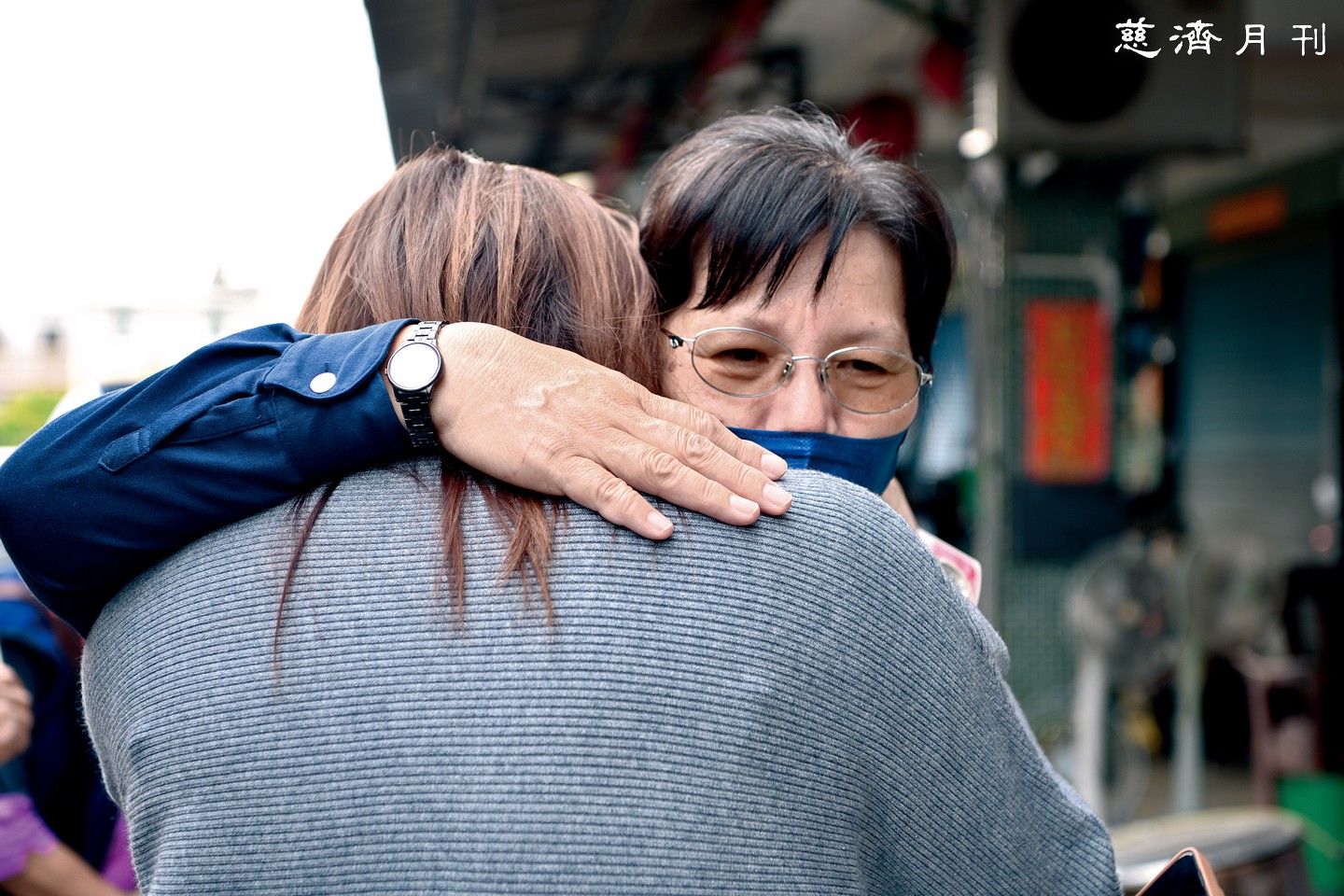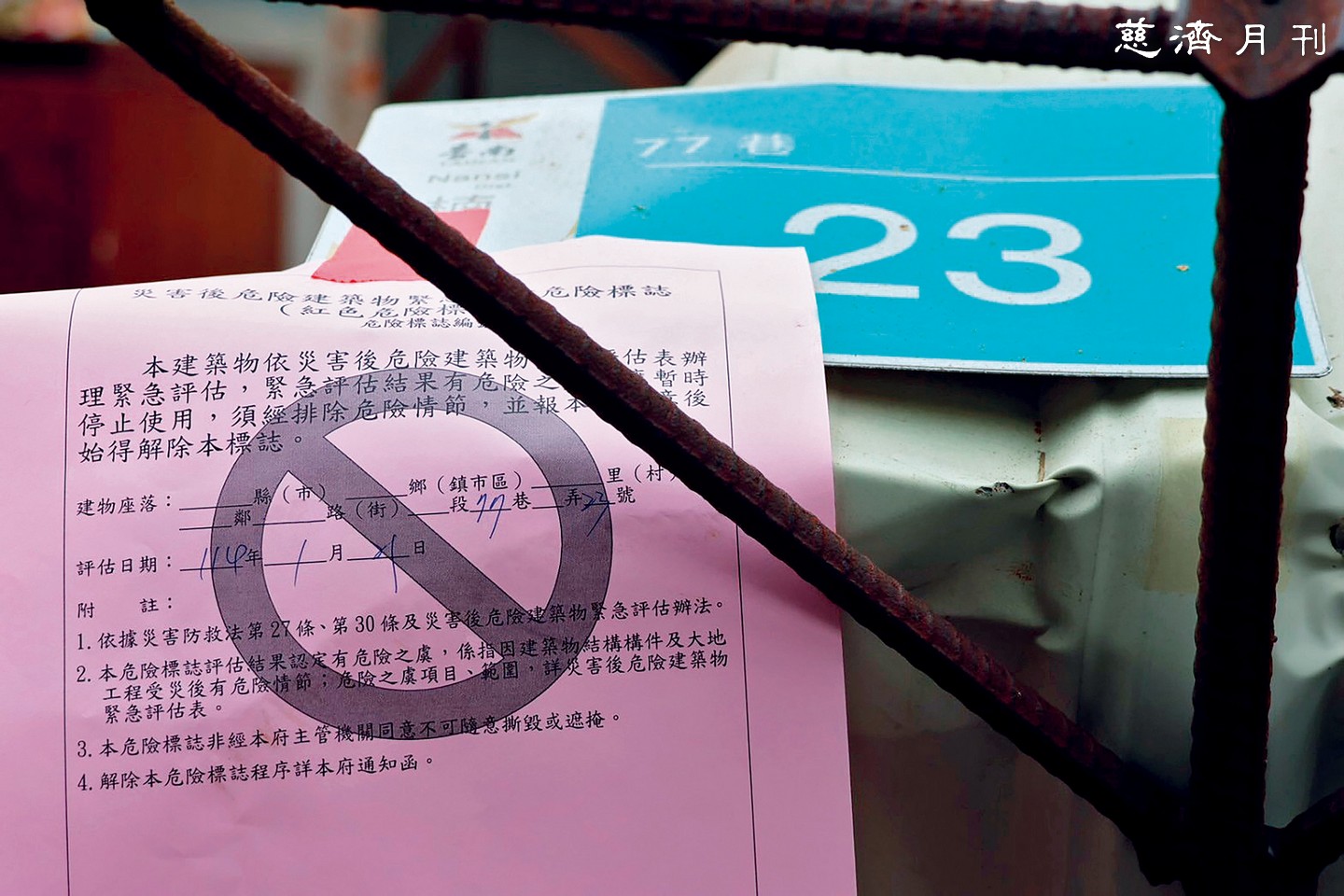三十一日 不辛苦,是幸福
1.31《農正月‧初三》

【靜思小語】不說辛苦,因為能造福是幸福;有這念愛心為人間付出,也要向自己說感恩。
前線精進,後勤全力支援
美國慈濟人透過網路視訊向上人拜年,並與上人座談。現在雖然是華人重視的農曆年節,師兄師姊們仍然為了洛杉磯山火賑災事務而忙碌;上人說,慈濟人是名副其實的人間菩薩,不為自己求安樂,只願眾生得離苦,為了陪伴照顧受災人,無暇享用過年的團圓飯,總是盡這一分愛的能量去付出。前線的慈濟人勇猛精進,後勤的法親也盡力支援,菩薩覺有情,很令人佩服與感恩!
美國慈濟人在這三十多年來,境內若有災難,就會從各州會合力量去救助。就如這次南加州洛杉磯山火,其他州郡的慈濟人,不辭路遠而來助緣,或是在各自的居住區域上街頭勸募。天候寒冷,大家穿著厚厚的衣物,捧著愛心箱,冒著寒凍向大眾呼籲。
「街頭勸募是為了募心,要警惕大家:天下有難了,人間要有愛,唯有愛才能消弭災難。募一分錢,多對人說幾句話,借重因緣教育眾生,是用愛弘法,開闊心胸、不分宗教。」
「對於大家,師父很感恩也很不捨;感恩,是大家的愛很整齊地發動起來;不捨,是風雪中還出去外面站著勸募。大家『幸福』了─不說苦,也確實是福,造福人間,而且相信大家內心是歡喜的,完成了這一天的大愛使命;付出之後也回向給自己,要對自己說感恩,感恩自己有這念愛心,扎扎實實為人間付出,將這一天過得很有價值。」
上人教大家及時盤點:今天在哪一條街上,遇到了多少愛心人來付出,要好好記錄下來。有紀錄、有心得,法親之間可以相互分享,彼此勉勵,借重因緣把愛心凝聚起來。
醫療傳法,提升精神理念
臺北慈濟醫院趙有誠院長領主管同仁返回精舍,先入座聆聽美國慈濟人分享與上人開示後,向上人拜年。上人說,慈濟四大志業起於慈善,因為做慈善,才能將慈濟因緣廣鋪全球,再與國際間的許多人結好緣。也因為做慈善,為了解開因病而貧、因貧而病的惡性循環,決定蓋醫院,建立了如今的醫療志業。一所醫院裏,除了醫師、護理師,各科室各司其職,缺一不可,即使過年期間也需要有人值守,隨時守護生命、守護健康、守護愛,醫療是人間不可或缺的志業。
聽到醫療同仁分享個案,人生無常,有時稍微碰撞,就造成危及性命的傷害,醫療團隊總是要幫助傷患與死神拔河。「每個人各有因緣,生命危急時,一邊是死神、一邊是福神,如果這個人的福報大,有好因緣,福神多出一點力,就能幫助醫療團隊把他搶救回來。但是有福的人守住了生命,恢復健康了,不知道能不能懂得利用身體來造福人間?」
上人期盼醫療志業也可以有傳法人,當醫療團隊救護病人,病人得救以後,「苦既拔已,復為說法」,讓其心得法而不再迷茫。「『為佛教,為眾生』,過去是為眾生而創立四大志業、八大法印,步步踏實走過來,得到這麼多好因緣的護持,慈濟大愛才能繞全球。我們現在應該要為未來的延續,每一個志業都要做好傳承。雖然大家都知道慈濟是佛教團體,慈濟醫院是佛教醫院,但是這所佛教的醫院有何內涵,除了救人性命、守護健康,精神理念為何?」
「我很想要讓人們的身心都健康,心有覺悟,行為自然就不會偏差。當然無法像佛陀那般覺悟成道,最起碼讓人在迷途中,有一個明確的方向可以走。不排斥其他宗教,但是我們也要多提升佛教,不要忘記佛法的精神理念。」
相互感恩,同行陡峭山路
越南陳大瑜師兄與師兄師姊十多人返回精舍拜年,王寬鴻師兄分享摩羯颱風過後,到災區發放的故事。發放前,志工家訪途中發現一名婦女躺在地上,旁邊另一位婦女抱著一個新生兒;原來是年輕孕婦從家中需徒步三小時才能走到衛生站分娩,卻在中途就生產了。見產婦身體虛弱又沒有食物,志工趕緊到附近雜貨店買雞蛋與礦泉水,請老闆幫忙燒水煮蛋給產婦補充營養。
接著志工再前往其中一戶受災家庭訪視,由於道路陡峭又狹窄,只能步行而上。案主一家以耕作與養殖為生,但田地因土石流被掩埋;過了不久,案主的女兒回到家中,手中抱著新生兒,原來就是志工在途中所見的那位年輕產婦,這段巧遇令志工感到不可思議。
上人開示:「你們隨著因緣,從臺灣到越南去經商、生活;腳踏著那一片土地,頭頂著那一片天,用真心的愛回饋當地。無論在哪裏造福,都是自己做、自己得,大家要相互感恩,因為有法親相伴,才能有更大的因緣去付出。」
上人感嘆剛才師兄簡報中的個案住屋甚為簡陋,是生活在臺灣難以想像的境界;也提到後續關心,慈濟人從河內到災區,每次都要爬山路,坡度很陡,路途遙遠,抵達案家大約五個小時,如果每三個月都前往,對志工們的體力與時間是一大負擔,可以在他們有需要下山的時候,相約送物資或補助生活費用。「很感恩大家克服很多困難去救助這個家庭,不過也要思考用其他方法,只要能確實幫助到他們,我們就安心。」
精舍過年,有空就常回來
「精舍過心年」功能組,包括人文真善美志工、交通組、活動組、書畫志工、機動組的師兄師姊與上人分享心得。上人感恩大家歡喜承擔精舍過年期間的許多事務,這裏是全球慈濟人的家,是大家共同走慈濟路的源頭,花蓮慈濟人有空就回來,多了解靜思法脈,更知道如何走慈濟的人間路,將慈濟精神鋪展到更廣闊的範圍。
「人生要有價值,總是要發揮功能,而且是發揮對人間有益的功能。走這條慈濟路就在利益人間,可以安心前進,並能走得很歡喜。有做有得,沒有做就沒有收穫,所以還是要把握時間,多做多得,年紀大的要不斷傳承,中生代、新生代要發心立願承接,讓志業代代相傳。」
屏東戴敦仁老師分享,他將熬夜剪接的習慣改成晨起工作,反而覺得更順利。上人遂言:「雖說要把握時間,也要斟酌運用,師父最不希望你們熬夜。有時你們寫文章或剪輯影片,都是一坐下去就不知起身,這樣不可以,要設定一段時間就起來走一走,運動一下;我們要做的事情還很多,所以要照顧好身體健康。」
上人教在座的資深慈濟人要與過去一起做事的法親聯絡,了解這群老夥伴的近況,代為傳達師父的關心與掛念;大家要相互照顧,把學佛法、行菩薩道的慈濟因緣連接好,代代相傳好因緣。
《證嚴上人衲履足跡》,是「上人之日記」。
靜思精舍常住每日敬侍師側、記錄言行,經融會貫通於心,轉化為字字珠璣,彙整結集,每年四冊,依春、夏、秋、冬四季出版。
本專欄即精簡摘錄自《證嚴上人衲履足跡》,完整版本請關注每季最新出版品。

1.31《農正月‧初三》

【靜思小語】不說辛苦,因為能造福是幸福;有這念愛心為人間付出,也要向自己說感恩。
前線精進,後勤全力支援
美國慈濟人透過網路視訊向上人拜年,並與上人座談。現在雖然是華人重視的農曆年節,師兄師姊們仍然為了洛杉磯山火賑災事務而忙碌;上人說,慈濟人是名副其實的人間菩薩,不為自己求安樂,只願眾生得離苦,為了陪伴照顧受災人,無暇享用過年的團圓飯,總是盡這一分愛的能量去付出。前線的慈濟人勇猛精進,後勤的法親也盡力支援,菩薩覺有情,很令人佩服與感恩!
美國慈濟人在這三十多年來,境內若有災難,就會從各州會合力量去救助。就如這次南加州洛杉磯山火,其他州郡的慈濟人,不辭路遠而來助緣,或是在各自的居住區域上街頭勸募。天候寒冷,大家穿著厚厚的衣物,捧著愛心箱,冒著寒凍向大眾呼籲。
「街頭勸募是為了募心,要警惕大家:天下有難了,人間要有愛,唯有愛才能消弭災難。募一分錢,多對人說幾句話,借重因緣教育眾生,是用愛弘法,開闊心胸、不分宗教。」
「對於大家,師父很感恩也很不捨;感恩,是大家的愛很整齊地發動起來;不捨,是風雪中還出去外面站著勸募。大家『幸福』了─不說苦,也確實是福,造福人間,而且相信大家內心是歡喜的,完成了這一天的大愛使命;付出之後也回向給自己,要對自己說感恩,感恩自己有這念愛心,扎扎實實為人間付出,將這一天過得很有價值。」
上人教大家及時盤點:今天在哪一條街上,遇到了多少愛心人來付出,要好好記錄下來。有紀錄、有心得,法親之間可以相互分享,彼此勉勵,借重因緣把愛心凝聚起來。
醫療傳法,提升精神理念
臺北慈濟醫院趙有誠院長領主管同仁返回精舍,先入座聆聽美國慈濟人分享與上人開示後,向上人拜年。上人說,慈濟四大志業起於慈善,因為做慈善,才能將慈濟因緣廣鋪全球,再與國際間的許多人結好緣。也因為做慈善,為了解開因病而貧、因貧而病的惡性循環,決定蓋醫院,建立了如今的醫療志業。一所醫院裏,除了醫師、護理師,各科室各司其職,缺一不可,即使過年期間也需要有人值守,隨時守護生命、守護健康、守護愛,醫療是人間不可或缺的志業。
聽到醫療同仁分享個案,人生無常,有時稍微碰撞,就造成危及性命的傷害,醫療團隊總是要幫助傷患與死神拔河。「每個人各有因緣,生命危急時,一邊是死神、一邊是福神,如果這個人的福報大,有好因緣,福神多出一點力,就能幫助醫療團隊把他搶救回來。但是有福的人守住了生命,恢復健康了,不知道能不能懂得利用身體來造福人間?」
上人期盼醫療志業也可以有傳法人,當醫療團隊救護病人,病人得救以後,「苦既拔已,復為說法」,讓其心得法而不再迷茫。「『為佛教,為眾生』,過去是為眾生而創立四大志業、八大法印,步步踏實走過來,得到這麼多好因緣的護持,慈濟大愛才能繞全球。我們現在應該要為未來的延續,每一個志業都要做好傳承。雖然大家都知道慈濟是佛教團體,慈濟醫院是佛教醫院,但是這所佛教的醫院有何內涵,除了救人性命、守護健康,精神理念為何?」
「我很想要讓人們的身心都健康,心有覺悟,行為自然就不會偏差。當然無法像佛陀那般覺悟成道,最起碼讓人在迷途中,有一個明確的方向可以走。不排斥其他宗教,但是我們也要多提升佛教,不要忘記佛法的精神理念。」
相互感恩,同行陡峭山路
越南陳大瑜師兄與師兄師姊十多人返回精舍拜年,王寬鴻師兄分享摩羯颱風過後,到災區發放的故事。發放前,志工家訪途中發現一名婦女躺在地上,旁邊另一位婦女抱著一個新生兒;原來是年輕孕婦從家中需徒步三小時才能走到衛生站分娩,卻在中途就生產了。見產婦身體虛弱又沒有食物,志工趕緊到附近雜貨店買雞蛋與礦泉水,請老闆幫忙燒水煮蛋給產婦補充營養。
接著志工再前往其中一戶受災家庭訪視,由於道路陡峭又狹窄,只能步行而上。案主一家以耕作與養殖為生,但田地因土石流被掩埋;過了不久,案主的女兒回到家中,手中抱著新生兒,原來就是志工在途中所見的那位年輕產婦,這段巧遇令志工感到不可思議。
上人開示:「你們隨著因緣,從臺灣到越南去經商、生活;腳踏著那一片土地,頭頂著那一片天,用真心的愛回饋當地。無論在哪裏造福,都是自己做、自己得,大家要相互感恩,因為有法親相伴,才能有更大的因緣去付出。」
上人感嘆剛才師兄簡報中的個案住屋甚為簡陋,是生活在臺灣難以想像的境界;也提到後續關心,慈濟人從河內到災區,每次都要爬山路,坡度很陡,路途遙遠,抵達案家大約五個小時,如果每三個月都前往,對志工們的體力與時間是一大負擔,可以在他們有需要下山的時候,相約送物資或補助生活費用。「很感恩大家克服很多困難去救助這個家庭,不過也要思考用其他方法,只要能確實幫助到他們,我們就安心。」
精舍過年,有空就常回來
「精舍過心年」功能組,包括人文真善美志工、交通組、活動組、書畫志工、機動組的師兄師姊與上人分享心得。上人感恩大家歡喜承擔精舍過年期間的許多事務,這裏是全球慈濟人的家,是大家共同走慈濟路的源頭,花蓮慈濟人有空就回來,多了解靜思法脈,更知道如何走慈濟的人間路,將慈濟精神鋪展到更廣闊的範圍。
「人生要有價值,總是要發揮功能,而且是發揮對人間有益的功能。走這條慈濟路就在利益人間,可以安心前進,並能走得很歡喜。有做有得,沒有做就沒有收穫,所以還是要把握時間,多做多得,年紀大的要不斷傳承,中生代、新生代要發心立願承接,讓志業代代相傳。」
屏東戴敦仁老師分享,他將熬夜剪接的習慣改成晨起工作,反而覺得更順利。上人遂言:「雖說要把握時間,也要斟酌運用,師父最不希望你們熬夜。有時你們寫文章或剪輯影片,都是一坐下去就不知起身,這樣不可以,要設定一段時間就起來走一走,運動一下;我們要做的事情還很多,所以要照顧好身體健康。」
上人教在座的資深慈濟人要與過去一起做事的法親聯絡,了解這群老夥伴的近況,代為傳達師父的關心與掛念;大家要相互照顧,把學佛法、行菩薩道的慈濟因緣連接好,代代相傳好因緣。
《證嚴上人衲履足跡》,是「上人之日記」。
靜思精舍常住每日敬侍師側、記錄言行,經融會貫通於心,轉化為字字珠璣,彙整結集,每年四冊,依春、夏、秋、冬四季出版。
本專欄即精簡摘錄自《證嚴上人衲履足跡》,完整版本請關注每季最新出版品。

八至九日 調和人間
1.8~9《農十二月‧初九至初十》

【靜思小語】人間有種種苦,要應眾生所需付出,用智慧調和眾生觀念。
彙編歷史,回報慈濟人
元月八日與志業體主管談話,上人期許人文志業把握時間,認真做出讓慈濟人有傳家意義的作品。「這件事非做不可,將近六十年來,慈濟真正對臺灣、對國際有助益。這不是我們自誇,而是真的有一群人長年累月在付出。所以,如果可以有一個融合影音、文字的紀錄,最重要的是文字。先做出有科技感,能吸引年輕人,讓他們願意深入了解文字內容,也將其中展現的法吸收入心;而且對於每一位委員的家庭,都有獨特的紀念價值,而且有傳承歷史的古樸之感,讓子孫後輩覺得很珍貴,值得世世代代傳下去。」
上人也提到隨著科技發展而快速汰舊換新,所以要找到可以永恆保存的方法。「是日已過」,不論大家有什麼想法與建議,都要及時提出來,經過討論與篩選,直到有最適合的選項,就認真執行。沒有慈濟人,就沒有現在的慈濟,做這份「傳家寶」,就等於慈濟回報慈濟人。
上人說,佛陀給予慧命,慈濟也是運用慧命,發揮在這個時代的人事物,很真誠、很實在地在人間膚慰苦難。人們受苦,不是用口頭關心或肢體的膚慰就能解除,有人窮困飢餓,所需要的是糧食救濟;有人身有病痛,所需要的是醫療救治。人間有種種苦,都要因應眾生的需要而付出。現在這個時代,眾生之病在於心不調和、理念不調,造成世界亂象;不調和的觀念是因為貪、瞋、癡導致,要用智慧設法調整。
「慈濟一直以來所做的事,都在祥和社會、造福人間。僅僅是教聯會成立,運用靜思語教學的老師遍布全臺與離島的各級學校,受教的孩子也會影響家庭,對臺灣社會有一股淨化的力量。」上人對主管們談到,要將參加過教聯會的老師、校長們再凝聚起來;過去曾經編輯《大愛引航》等教案也很有教育價值,是不少人的精神食糧,所以現在構思設計「傳家寶」贈予慈濟人,也要用以感恩老師們及教案編輯者。
上人說,靜思法脈的延續,是法脈人的責任;而慈濟宗門已立,慈濟立宗不是只在佛教的範圍裏開山立宗,而是開出人間的一條道路,不分種族、國籍,總是得知哪裏有苦難、哪裏有人需要,慈濟就到哪裏去付出。要給慈濟人的紀念品或傳家寶,要將精神理念化為文字,還要設計、製作出高品質,讓人看起來就覺得值得珍藏。
上人說,過去的慈濟歷史紀錄要再彙整,若放由散落而致不見,會對不起那個時代辛苦投入的人。就如最初在花蓮市成立義診所時,幾位省立花蓮醫院的醫師前來襄助,包括張有傳、張澄溫醫師父子,還有黃博施醫師、朱隆陽醫師、鄒永宏醫師等人,除了定期在義診所為貧苦病患看診,也會利用假期搭巴士到較遠的鄉鎮去付出。還記得有一座橋,是火車和汽車共用,有一次義診的巴士輪子被鐵軌卡住,眼看著火車就要來了,很緊張,幸好有驚無險通過。
「我們從義診到蓋醫院的過程,現在的新進者大多不清楚,所以人文志業要將資料整理好並呈現出來。」上人說,將早期做志業,篳路藍縷的辛苦歷程展現出來,也能讓大眾知道慈濟是如何做出今天的成果,讓國際感受到臺灣的大愛;過去慈濟人總是低頭做事,走過幾十年歲月,也應該抬起頭來看廣布國際的「藍天白雲」,感恩走入慈濟,用生命、用力量去付出的慈濟人,給予真誠的回饋。
上人請人文志業將過去出版品盤點清楚,做好彙整,留下「文字般若」。「我常提起大藏經是佛陀入滅許久之後,才有口頭上的集結;口耳相傳的法到幾百年後才有文字紀錄,難以確認是否佛陀原話,後人只能掌握佛陀的精神理念,揣摩佛陀覺悟以後的心靈境界。佛陀為眾生開示,引導眾生悟入佛陀思想,等於為我們開一條道路,而且引導要如何走,分寸不能偏差,所以佛陀是人間導師,讓我們走在正確的方向,建立正知、正見、正思惟。」
「我們現在要將佛法導入人間,也要把握這個原則,而慈濟做到了,但不是靠一個人做出來的,是有這麼多人,共同往這個方向合力去做,分寸不偏移,才將這條路走得愈長遠、愈寬廣。」上人說,寶貴的資料不能遺漏,而且要留有文字,唯有文字才能留住慧命。
對治疫病,中西醫合療
元月九日與王志宏師兄、呂慈悅師姊以及王端正執行長等人談話時,提到現在流感疫情升溫,還有不同的病毒肆虐,上人說起早期臺灣社會若有感冒流行,在各個家庭裏會煮芥菜、蕃薯、薑,薑是老薑,要煮得辣辣地,加以對治,這是民間的祕方,材料也很容易取得。
上人認為在感冒大流行時,中醫、西醫都可以研究對治的方法,中西醫合療;除了中藥與西藥,也可以研究民間的食療,也許用自然的方法提升免疫力,可以讓疾病不藥而癒。
談及「傳家寶」的設計,上人表示,只要掌握觀念、擬定方案,就要把握時間去進行,要在慈濟六十周年慶之前完成;無論是書籍或紀念品,都要實際製作生產。
如規如矩,認真每一天
與志業體主管談話時,上人提到般若部的經典很多,《心經》則濃縮般若經典的精神,成為二百六十字。
「我們是用色眼看人,還是用法眼看人?若用色眼看人,就是辨別所看到的是哪一位,認識某某人是什麼樣貌;聽這個人在說什麼話,在現場用直覺反應,就是六根接觸六塵而產生六識。眼睛看到形貌、耳朵聽到聲音,都是各人的眼耳功能,出聲的人則是動舌根。各人的六根,也要使用得恰恰好,否則當一個人要講話,另一個人搶話,彼此重疊,說不清也聽不清,就很不恰當。」
佛法名相中,有諸多法數,王端正執行長說,六根、六塵、六識,總共為十八界。上人言,其實認真做每天的事情,如規如矩把事情做好,就是最如法。
談及草木成分的研究和製作有益人體健康的產品,上人期許醫療與教育志業持續合作,做出更多利益人群的成品。「草木皆有靈,各有可以運用的成分。上一趟行腳時,康芮颱風把精舍園區的樹木吹倒了,包括樟樹、肖楠等樹木,常住將鋸下來的樹幹、樹枝拿去萃取精油;這些精油可以去分析成分,各種樹木都不同。」
上人談到早期對弟子講經,如《四十二章經》、《佛遺教經》、《八大人覺經》等,經文篇幅較短,自己都要求弟子背誦經文;不只是佛典,早期德慈師父等人還要背《論語》、《大學》等四書,自己對弟子很嚴格,而弟子都很聽話、很守規矩。現在是無法一一要求大家,不過幸好談話都有紀錄,將來一段段整理完成,就可以完整流傳。
《證嚴上人衲履足跡》,是「上人之日記」。
靜思精舍常住每日敬侍師側、記錄言行,經融會貫通於心,轉化為字字珠璣,彙整結集,每年四冊,依春、夏、秋、冬四季出版。
本專欄即精簡摘錄自《證嚴上人衲履足跡》,完整版本請關注每季最新出版品。

1.8~9《農十二月‧初九至初十》

【靜思小語】人間有種種苦,要應眾生所需付出,用智慧調和眾生觀念。
彙編歷史,回報慈濟人
元月八日與志業體主管談話,上人期許人文志業把握時間,認真做出讓慈濟人有傳家意義的作品。「這件事非做不可,將近六十年來,慈濟真正對臺灣、對國際有助益。這不是我們自誇,而是真的有一群人長年累月在付出。所以,如果可以有一個融合影音、文字的紀錄,最重要的是文字。先做出有科技感,能吸引年輕人,讓他們願意深入了解文字內容,也將其中展現的法吸收入心;而且對於每一位委員的家庭,都有獨特的紀念價值,而且有傳承歷史的古樸之感,讓子孫後輩覺得很珍貴,值得世世代代傳下去。」
上人也提到隨著科技發展而快速汰舊換新,所以要找到可以永恆保存的方法。「是日已過」,不論大家有什麼想法與建議,都要及時提出來,經過討論與篩選,直到有最適合的選項,就認真執行。沒有慈濟人,就沒有現在的慈濟,做這份「傳家寶」,就等於慈濟回報慈濟人。
上人說,佛陀給予慧命,慈濟也是運用慧命,發揮在這個時代的人事物,很真誠、很實在地在人間膚慰苦難。人們受苦,不是用口頭關心或肢體的膚慰就能解除,有人窮困飢餓,所需要的是糧食救濟;有人身有病痛,所需要的是醫療救治。人間有種種苦,都要因應眾生的需要而付出。現在這個時代,眾生之病在於心不調和、理念不調,造成世界亂象;不調和的觀念是因為貪、瞋、癡導致,要用智慧設法調整。
「慈濟一直以來所做的事,都在祥和社會、造福人間。僅僅是教聯會成立,運用靜思語教學的老師遍布全臺與離島的各級學校,受教的孩子也會影響家庭,對臺灣社會有一股淨化的力量。」上人對主管們談到,要將參加過教聯會的老師、校長們再凝聚起來;過去曾經編輯《大愛引航》等教案也很有教育價值,是不少人的精神食糧,所以現在構思設計「傳家寶」贈予慈濟人,也要用以感恩老師們及教案編輯者。
上人說,靜思法脈的延續,是法脈人的責任;而慈濟宗門已立,慈濟立宗不是只在佛教的範圍裏開山立宗,而是開出人間的一條道路,不分種族、國籍,總是得知哪裏有苦難、哪裏有人需要,慈濟就到哪裏去付出。要給慈濟人的紀念品或傳家寶,要將精神理念化為文字,還要設計、製作出高品質,讓人看起來就覺得值得珍藏。
上人說,過去的慈濟歷史紀錄要再彙整,若放由散落而致不見,會對不起那個時代辛苦投入的人。就如最初在花蓮市成立義診所時,幾位省立花蓮醫院的醫師前來襄助,包括張有傳、張澄溫醫師父子,還有黃博施醫師、朱隆陽醫師、鄒永宏醫師等人,除了定期在義診所為貧苦病患看診,也會利用假期搭巴士到較遠的鄉鎮去付出。還記得有一座橋,是火車和汽車共用,有一次義診的巴士輪子被鐵軌卡住,眼看著火車就要來了,很緊張,幸好有驚無險通過。
「我們從義診到蓋醫院的過程,現在的新進者大多不清楚,所以人文志業要將資料整理好並呈現出來。」上人說,將早期做志業,篳路藍縷的辛苦歷程展現出來,也能讓大眾知道慈濟是如何做出今天的成果,讓國際感受到臺灣的大愛;過去慈濟人總是低頭做事,走過幾十年歲月,也應該抬起頭來看廣布國際的「藍天白雲」,感恩走入慈濟,用生命、用力量去付出的慈濟人,給予真誠的回饋。
上人請人文志業將過去出版品盤點清楚,做好彙整,留下「文字般若」。「我常提起大藏經是佛陀入滅許久之後,才有口頭上的集結;口耳相傳的法到幾百年後才有文字紀錄,難以確認是否佛陀原話,後人只能掌握佛陀的精神理念,揣摩佛陀覺悟以後的心靈境界。佛陀為眾生開示,引導眾生悟入佛陀思想,等於為我們開一條道路,而且引導要如何走,分寸不能偏差,所以佛陀是人間導師,讓我們走在正確的方向,建立正知、正見、正思惟。」
「我們現在要將佛法導入人間,也要把握這個原則,而慈濟做到了,但不是靠一個人做出來的,是有這麼多人,共同往這個方向合力去做,分寸不偏移,才將這條路走得愈長遠、愈寬廣。」上人說,寶貴的資料不能遺漏,而且要留有文字,唯有文字才能留住慧命。
對治疫病,中西醫合療
元月九日與王志宏師兄、呂慈悅師姊以及王端正執行長等人談話時,提到現在流感疫情升溫,還有不同的病毒肆虐,上人說起早期臺灣社會若有感冒流行,在各個家庭裏會煮芥菜、蕃薯、薑,薑是老薑,要煮得辣辣地,加以對治,這是民間的祕方,材料也很容易取得。
上人認為在感冒大流行時,中醫、西醫都可以研究對治的方法,中西醫合療;除了中藥與西藥,也可以研究民間的食療,也許用自然的方法提升免疫力,可以讓疾病不藥而癒。
談及「傳家寶」的設計,上人表示,只要掌握觀念、擬定方案,就要把握時間去進行,要在慈濟六十周年慶之前完成;無論是書籍或紀念品,都要實際製作生產。
如規如矩,認真每一天
與志業體主管談話時,上人提到般若部的經典很多,《心經》則濃縮般若經典的精神,成為二百六十字。
「我們是用色眼看人,還是用法眼看人?若用色眼看人,就是辨別所看到的是哪一位,認識某某人是什麼樣貌;聽這個人在說什麼話,在現場用直覺反應,就是六根接觸六塵而產生六識。眼睛看到形貌、耳朵聽到聲音,都是各人的眼耳功能,出聲的人則是動舌根。各人的六根,也要使用得恰恰好,否則當一個人要講話,另一個人搶話,彼此重疊,說不清也聽不清,就很不恰當。」
佛法名相中,有諸多法數,王端正執行長說,六根、六塵、六識,總共為十八界。上人言,其實認真做每天的事情,如規如矩把事情做好,就是最如法。
談及草木成分的研究和製作有益人體健康的產品,上人期許醫療與教育志業持續合作,做出更多利益人群的成品。「草木皆有靈,各有可以運用的成分。上一趟行腳時,康芮颱風把精舍園區的樹木吹倒了,包括樟樹、肖楠等樹木,常住將鋸下來的樹幹、樹枝拿去萃取精油;這些精油可以去分析成分,各種樹木都不同。」
上人談到早期對弟子講經,如《四十二章經》、《佛遺教經》、《八大人覺經》等,經文篇幅較短,自己都要求弟子背誦經文;不只是佛典,早期德慈師父等人還要背《論語》、《大學》等四書,自己對弟子很嚴格,而弟子都很聽話、很守規矩。現在是無法一一要求大家,不過幸好談話都有紀錄,將來一段段整理完成,就可以完整流傳。
《證嚴上人衲履足跡》,是「上人之日記」。
靜思精舍常住每日敬侍師側、記錄言行,經融會貫通於心,轉化為字字珠璣,彙整結集,每年四冊,依春、夏、秋、冬四季出版。
本專欄即精簡摘錄自《證嚴上人衲履足跡》,完整版本請關注每季最新出版品。

二十一日 誠意感動天地
1.21《農十二月‧二十二》

【靜思小語】發自內心虔誠祈禱,真誠付出行動造福,感動天地轉禍為安。
喚醒人心警覺
凌晨零點十七分,嘉義縣大埔鄉發生芮氏規模六點四、深度約九點七公里的淺層強震,臺南楠西區、白河區與東山區,因緊鄰震央,也傳出民房受損災情。
上人掛念災情,透過視訊連線,聽取臺南、嘉義、高雄慈濟人及臺南慈濟中學、大林慈濟醫院主管報告,慈善志業顏博文執行長、人文志業王端正執行長、醫療志業林俊龍執行長、教育志業王本榮執行長等人在座。精舍常住師父、張濟舵副執行長等人在花蓮本會透過連線與會。
臺南張文郎、嚴聖賢師兄、黃惠師姊等人在楠西區老人文康中心連線報告安置情形。上人說:「在災難發生之後,臺南多位居士們都很迅速反應,所以我比較安心。不過這次受災地區有許多年紀大的鄉親,要與鄰里長互動,詢問老人家們有什麼需求,需要什麼幫助,先去關懷他們。」
上人說,大家平時與鄰里長常有互動,此時更需要快速聯絡,傳達關心;地震突如其來,鄉親都受到驚嚇,慈濟人要趕快走近身邊膚慰,讓他們可以安心。請大家虔誠祈禱,並且呼籲大眾茹素,因為災難是擋不住的,唯有淨化人心,才能減輕業力。「不論信仰什麼宗教,都要有虔誠的信念;慈濟人要不斷宣導、帶動戒慎虔誠,茹素齋戒。」
住在震央大埔鄉的陳勵譁、林余淑卿師姊報平安,並表示會繼續關懷法親與鄉親。上人回應:「只要聽到大家平安,我就先安心;法親之間要彼此聯絡,相互關懷,也代替師父傳達關心與祝福,平安就是福。」
大林慈院賴寧生院長、劉鎮榮主祕報告地震後巡視院區,關懷斗六慈院、嘉義慈濟診所、大埔醫療站的情形。上人表達感恩並提醒:「可能還會有餘震,所以不能掉以輕心;山路還不穩定,暫時不要上山,盡量照顧好大家的安全。」
高雄方上榮、潘機利師兄報平安,並已啟動法親關懷,一早也與張文郎師兄聯繫,臺南若有需要將支援人力、物力。
上人開示:「我們共同一心,我的心與大家同在。就美國洛杉磯林火的大災難來說,我這幾天的心都掛在那裏。想起曾經說過,哪怕是一隻小鳥,也會口銜樹枝、樹葉去沾水,想要撲滅森林大火;雖然是很不自量力,但最終感動了天地而降雨滅火。我們一定要有這一分信心,要發自內心的虔誠,去面對這場尚未停息的大火,持續不斷地呼喚大家戒慎虔誠,並推動素食,非素不可!」
上人說起早期臺灣有「五年二醮」的習俗,在五年中要作醮二次,為地方祈安;在作醮的七天期間,人人虔誠茹素,連菜市場都禁屠。「經過五十多年,人們虔誠的信心慢慢淡薄,所以我也很擔憂,長久以往,大家會遺忘這分虔誠的信念。幸好在這五十多年來,慈濟人走入人間,呼籲大眾虔誠齋戒,且獲得響應,感覺還有一點效用。」
上人指出,天地威力強勁,是眾生共業所致;共惡業就成災難,共善業即成福報。這次天地一動,再次把人心震撼起來,將大家在睡夢中震醒。但願這麼一震,能喚醒大家有所警覺,重新建設這一念心,相勉發揮虔誠的愛心,付出真誠的行動。
「唯有真誠的心才能感動天地,所以我們要帶動人人虔誠造福。慈濟人在各地推動富有愛心店,響應的店家會放置竹筒撲滿,我們也可以設計,當有人投入一個銅板,竹筒就會發出聲音,提醒大家要戒慎虔誠。此外,我們也要廣發訊息,膚慰人心之外,還能讓人眼睛看到、耳朵聽到法。」
上人說,目前看來,雖然地震過後有房屋倒塌或毀損,也有人受傷,但大致平安,這也讓大家有所覺醒:天災擋不住,唯有淨化人心,所以要不間斷地呼籲虔誠祈禱、齋戒茹素,讓人人提起這些信念並付諸行動。
「當前國際間除了有四大不調的天災發生,還有俄烏戰爭等人禍未歇;天災人禍並起,人心波動不已,但盼這波動盪能早日平息,讓大眾平順度過災厄。讓人擔憂的事很多,但是不論如何,我們都要把握現在,能做快做、積極去做,因為世間無常,今日不知明日事。期盼眾生共造福、共行善,也許人心平和,災禍也能平靜下來;人心轉惡為善,天下自然能轉禍為福。」
《證嚴上人衲履足跡》,是「上人之日記」。
靜思精舍常住每日敬侍師側、記錄言行,經融會貫通於心,轉化為字字珠璣,彙整結集,每年四冊,依春、夏、秋、冬四季出版。
本專欄即精簡摘錄自《證嚴上人衲履足跡》,完整版本請關注每季最新出版品。

1.21《農十二月‧二十二》

【靜思小語】發自內心虔誠祈禱,真誠付出行動造福,感動天地轉禍為安。
喚醒人心警覺
凌晨零點十七分,嘉義縣大埔鄉發生芮氏規模六點四、深度約九點七公里的淺層強震,臺南楠西區、白河區與東山區,因緊鄰震央,也傳出民房受損災情。
上人掛念災情,透過視訊連線,聽取臺南、嘉義、高雄慈濟人及臺南慈濟中學、大林慈濟醫院主管報告,慈善志業顏博文執行長、人文志業王端正執行長、醫療志業林俊龍執行長、教育志業王本榮執行長等人在座。精舍常住師父、張濟舵副執行長等人在花蓮本會透過連線與會。
臺南張文郎、嚴聖賢師兄、黃惠師姊等人在楠西區老人文康中心連線報告安置情形。上人說:「在災難發生之後,臺南多位居士們都很迅速反應,所以我比較安心。不過這次受災地區有許多年紀大的鄉親,要與鄰里長互動,詢問老人家們有什麼需求,需要什麼幫助,先去關懷他們。」
上人說,大家平時與鄰里長常有互動,此時更需要快速聯絡,傳達關心;地震突如其來,鄉親都受到驚嚇,慈濟人要趕快走近身邊膚慰,讓他們可以安心。請大家虔誠祈禱,並且呼籲大眾茹素,因為災難是擋不住的,唯有淨化人心,才能減輕業力。「不論信仰什麼宗教,都要有虔誠的信念;慈濟人要不斷宣導、帶動戒慎虔誠,茹素齋戒。」
住在震央大埔鄉的陳勵譁、林余淑卿師姊報平安,並表示會繼續關懷法親與鄉親。上人回應:「只要聽到大家平安,我就先安心;法親之間要彼此聯絡,相互關懷,也代替師父傳達關心與祝福,平安就是福。」
大林慈院賴寧生院長、劉鎮榮主祕報告地震後巡視院區,關懷斗六慈院、嘉義慈濟診所、大埔醫療站的情形。上人表達感恩並提醒:「可能還會有餘震,所以不能掉以輕心;山路還不穩定,暫時不要上山,盡量照顧好大家的安全。」
高雄方上榮、潘機利師兄報平安,並已啟動法親關懷,一早也與張文郎師兄聯繫,臺南若有需要將支援人力、物力。
上人開示:「我們共同一心,我的心與大家同在。就美國洛杉磯林火的大災難來說,我這幾天的心都掛在那裏。想起曾經說過,哪怕是一隻小鳥,也會口銜樹枝、樹葉去沾水,想要撲滅森林大火;雖然是很不自量力,但最終感動了天地而降雨滅火。我們一定要有這一分信心,要發自內心的虔誠,去面對這場尚未停息的大火,持續不斷地呼喚大家戒慎虔誠,並推動素食,非素不可!」
上人說起早期臺灣有「五年二醮」的習俗,在五年中要作醮二次,為地方祈安;在作醮的七天期間,人人虔誠茹素,連菜市場都禁屠。「經過五十多年,人們虔誠的信心慢慢淡薄,所以我也很擔憂,長久以往,大家會遺忘這分虔誠的信念。幸好在這五十多年來,慈濟人走入人間,呼籲大眾虔誠齋戒,且獲得響應,感覺還有一點效用。」
上人指出,天地威力強勁,是眾生共業所致;共惡業就成災難,共善業即成福報。這次天地一動,再次把人心震撼起來,將大家在睡夢中震醒。但願這麼一震,能喚醒大家有所警覺,重新建設這一念心,相勉發揮虔誠的愛心,付出真誠的行動。
「唯有真誠的心才能感動天地,所以我們要帶動人人虔誠造福。慈濟人在各地推動富有愛心店,響應的店家會放置竹筒撲滿,我們也可以設計,當有人投入一個銅板,竹筒就會發出聲音,提醒大家要戒慎虔誠。此外,我們也要廣發訊息,膚慰人心之外,還能讓人眼睛看到、耳朵聽到法。」
上人說,目前看來,雖然地震過後有房屋倒塌或毀損,也有人受傷,但大致平安,這也讓大家有所覺醒:天災擋不住,唯有淨化人心,所以要不間斷地呼籲虔誠祈禱、齋戒茹素,讓人人提起這些信念並付諸行動。
「當前國際間除了有四大不調的天災發生,還有俄烏戰爭等人禍未歇;天災人禍並起,人心波動不已,但盼這波動盪能早日平息,讓大眾平順度過災厄。讓人擔憂的事很多,但是不論如何,我們都要把握現在,能做快做、積極去做,因為世間無常,今日不知明日事。期盼眾生共造福、共行善,也許人心平和,災禍也能平靜下來;人心轉惡為善,天下自然能轉禍為福。」
《證嚴上人衲履足跡》,是「上人之日記」。
靜思精舍常住每日敬侍師側、記錄言行,經融會貫通於心,轉化為字字珠璣,彙整結集,每年四冊,依春、夏、秋、冬四季出版。
本專欄即精簡摘錄自《證嚴上人衲履足跡》,完整版本請關注每季最新出版品。

三至四日 傳家寶
1.3~4《農十二月‧初四至初五》

【靜思小語】積善傳家,更要揚德,留下故事以教化後世、度化人間。
菩薩史,大藏經
元月三日,上人教導志業體主管,發心為大眾做事,要不厭其煩,像自己說話,同一件事會一再重複敘說,因為這件事是重要的事情,要讓大家朝同一個方向努力,所以講再多次也要說,而且所要做的是為大眾,不是為私己;慈濟在為人間做什麼事,要讓大眾知道。
言及自己從過去就是看到人間有需要的當下就去做,如此才有今天的慈濟,上人指出,以前是孤鳥萬里行,不管這隻鳥要往東、要往西,都有自己的方向;而現在是鳥群,領頭的鳥要帶著群體飛翔,而且鳥群的隊伍也要排列得很有次序。
慈濟即將在明年五月歡慶六十周年,上人感恩慈濟人跟隨自己走過一甲子的歲月,且許多資深慈濟人盡此生無私奉獻,與人文志業王端正執行長等人談到構思贈予慈濟人「傳家寶」。
「慈濟邁向六十年,我們應該要很慎重地給予慈濟人一個傳家寶。慈濟人一輩子都奉獻給慈濟,我應該要給予法,讓他們得一法能解萬法,拿到這個東西就想到師父帶自己怎樣走菩薩道;而他們再傳給兒女後輩,讓子孫知道父母長輩整天忙忙碌碌,原來就是為人間做善事。我希望這份『傳家寶』可以做到這個程度,這就是價值;慈濟人的生命價值,可以用這份『傳家寶』表達。」
上人說,慈濟人與慈濟事很多,也因為慈濟為人間做很多事情,需要很多人投入心力才能成就,所有的人與事都值得流傳千古。「要將慈濟人的行誼事蹟代代相傳,不只傳給子孫,也是積善揚德─他們真的有這些善行、德行,值得讓人知道。我總感覺若沒有做,會對不起這些走入慈濟以後,做很多事、付出很多的慈濟人;而這份傳家寶傳給後代,除了表揚慈濟人的德,也能教育後世、度化人間。」
上人說,自從慈濟創立以來,許多慈濟人長時間出錢出力做慈濟,護持志業建設,成就許多利益人間的好事,但都不居功,不願意受表揚,不過他們的點滴付出都有紀錄,此時盤點起來,看到這些紀錄,更為感恩與感動,更想將他們的德行、事蹟表達出來。「他們真正在做事,但是『心無罣礙,無罣礙故』,所以沒有執著,成就了慈濟志業,讓慈濟得以做這麼多救人的好事。最近深感人生無常,故期待要把這些事情趕快討論定案,把握時間處理好。」
上人期盼做出具有人文氣質感的成品,最好是實體書,一本本排起來,隨時探手拿取,如同閱讀藏經一般。慈濟史也堪稱藏經,因為都是現代的人間菩薩真正貢獻心力,付出無所求而寫下的歷史。「我們盡量做到讓他們的子孫看了以後,會感恩、感念父母或阿公阿嬤的德行,並且覺得『慈濟與我有關』,對長輩的付出與有榮焉。」
一滴水,入大海
與高雄慈濟人談話,潘機利師兄談到高雄榮董團隊持續響應與護持佛陀故鄉專案;上人說,臺灣很有福報,因為有這麼多愛心人,為臺灣社會做不少事,也為國際大力付出;慈濟的思想理念來自佛陀,現在有因緣,大家又願意發心回饋佛陀的故鄉,幫助佛陀出生地的居民,讓自己覺得很圓滿。
「我覺得自己這輩子足夠了、很值得!因為有這麼多大因緣、大護法,從當初的五毛錢走到今天,即將屆滿六十年,在臺灣已經有八所慈濟醫院、一間慈濟診所,四所慈濟學校,還不算援建的幾十所希望工程學校,真的很不簡單!」
「不論你們付出多少,滴水入大海,大海的水都有人人的一分力量;不過,自己做還是自己得,得到為人間付出之後的成就與心得。粒米成籮、滴水成河,不管個人付出的多寡、力量的大小,全球慈濟人與會眾的愛心合起來,力量就很大。盤點起來,真正覺得這輩子說對話、做對事,也走對路。」
「師父想要回報所有的慈濟人,讓每一個家庭有傳家寶,傳給後輩留作紀念,讓子孫留有祖先做慈濟的歷史紀錄。」上人教師兄師姊們將自己的人生過程,以及走入慈濟的因緣、所做的慈濟事,好好回溯、整理出來,收錄於慈濟大藏經,留下這個時代的人間菩薩史。
五毛錢,一念善
元月四日與志業體主管談話,上人說起書寫慈濟人的菩薩家譜,在慈濟六十周年時,給予慈濟人可以世代相傳的「傳家寶」;期待大家也可以對「傳家寶」的形式提出建議。希望藉由這份「傳家寶」,讓慈濟人的子孫知道,父母長輩為社會付出,而且真的做了不少利益人間的好事;慈濟人也要自我認知,做到了這麼多事,值得留念。
上人說,如座中幾位大醫王都是第一代,是第一批投入醫療志業者。「若沒有第一批願意到花蓮慈濟醫院任職的醫護人員,慈濟醫院哪有辦法運作?所以很感恩!若沒有你們從醫療開始做起,我也不會因為感受到東部的護理人才招募不易,才想要成立護專培養護理人員;且亦覺得要培養好醫師很不簡單,才設立醫學院。而且我做事都想得比較長遠,設醫學院時,就想到將來會成立大學。」
「雖然蓋醫院、設學校對當時的慈濟來說,實在是自不量力,但我很有福,總是遇到好人,我若提出想要做的事,沒有人會阻擋我,而是得到大家的支持。」
「大藏經裏有很多故事,不一定都是佛陀講的,佛經也是後來的人結集、整理的;慈濟歷史有很多人物傳記,還有當事人與旁人見證的真實紀錄。只說慈濟剛起步時的竹筒歲月,每人每天存五毛錢做慈善,家庭主婦出門買菜之前記得要省五毛錢投竹筒,存著這一念心,到菜市場就會對菜販說,少拿一些菜,要存五角救人,引起聽者的好奇詢問,這個方法就此傳播開來,人人都覺得自己也做得到而紛紛響應。所以不要輕視這五毛錢,最初那三十位家庭主婦小小的力量與舉動中隱藏著智慧。所以我覺得這樣的故事一定要寫出來,而且呈現的方式要有質感。」
《證嚴上人衲履足跡》,是「上人之日記」。
靜思精舍常住每日敬侍師側、記錄言行,經融會貫通於心,轉化為字字珠璣,彙整結集,每年四冊,依春、夏、秋、冬四季出版。
本專欄即精簡摘錄自《證嚴上人衲履足跡》,完整版本請關注每季最新出版品。

1.3~4《農十二月‧初四至初五》

【靜思小語】積善傳家,更要揚德,留下故事以教化後世、度化人間。
菩薩史,大藏經
元月三日,上人教導志業體主管,發心為大眾做事,要不厭其煩,像自己說話,同一件事會一再重複敘說,因為這件事是重要的事情,要讓大家朝同一個方向努力,所以講再多次也要說,而且所要做的是為大眾,不是為私己;慈濟在為人間做什麼事,要讓大眾知道。
言及自己從過去就是看到人間有需要的當下就去做,如此才有今天的慈濟,上人指出,以前是孤鳥萬里行,不管這隻鳥要往東、要往西,都有自己的方向;而現在是鳥群,領頭的鳥要帶著群體飛翔,而且鳥群的隊伍也要排列得很有次序。
慈濟即將在明年五月歡慶六十周年,上人感恩慈濟人跟隨自己走過一甲子的歲月,且許多資深慈濟人盡此生無私奉獻,與人文志業王端正執行長等人談到構思贈予慈濟人「傳家寶」。
「慈濟邁向六十年,我們應該要很慎重地給予慈濟人一個傳家寶。慈濟人一輩子都奉獻給慈濟,我應該要給予法,讓他們得一法能解萬法,拿到這個東西就想到師父帶自己怎樣走菩薩道;而他們再傳給兒女後輩,讓子孫知道父母長輩整天忙忙碌碌,原來就是為人間做善事。我希望這份『傳家寶』可以做到這個程度,這就是價值;慈濟人的生命價值,可以用這份『傳家寶』表達。」
上人說,慈濟人與慈濟事很多,也因為慈濟為人間做很多事情,需要很多人投入心力才能成就,所有的人與事都值得流傳千古。「要將慈濟人的行誼事蹟代代相傳,不只傳給子孫,也是積善揚德─他們真的有這些善行、德行,值得讓人知道。我總感覺若沒有做,會對不起這些走入慈濟以後,做很多事、付出很多的慈濟人;而這份傳家寶傳給後代,除了表揚慈濟人的德,也能教育後世、度化人間。」
上人說,自從慈濟創立以來,許多慈濟人長時間出錢出力做慈濟,護持志業建設,成就許多利益人間的好事,但都不居功,不願意受表揚,不過他們的點滴付出都有紀錄,此時盤點起來,看到這些紀錄,更為感恩與感動,更想將他們的德行、事蹟表達出來。「他們真正在做事,但是『心無罣礙,無罣礙故』,所以沒有執著,成就了慈濟志業,讓慈濟得以做這麼多救人的好事。最近深感人生無常,故期待要把這些事情趕快討論定案,把握時間處理好。」
上人期盼做出具有人文氣質感的成品,最好是實體書,一本本排起來,隨時探手拿取,如同閱讀藏經一般。慈濟史也堪稱藏經,因為都是現代的人間菩薩真正貢獻心力,付出無所求而寫下的歷史。「我們盡量做到讓他們的子孫看了以後,會感恩、感念父母或阿公阿嬤的德行,並且覺得『慈濟與我有關』,對長輩的付出與有榮焉。」
一滴水,入大海
與高雄慈濟人談話,潘機利師兄談到高雄榮董團隊持續響應與護持佛陀故鄉專案;上人說,臺灣很有福報,因為有這麼多愛心人,為臺灣社會做不少事,也為國際大力付出;慈濟的思想理念來自佛陀,現在有因緣,大家又願意發心回饋佛陀的故鄉,幫助佛陀出生地的居民,讓自己覺得很圓滿。
「我覺得自己這輩子足夠了、很值得!因為有這麼多大因緣、大護法,從當初的五毛錢走到今天,即將屆滿六十年,在臺灣已經有八所慈濟醫院、一間慈濟診所,四所慈濟學校,還不算援建的幾十所希望工程學校,真的很不簡單!」
「不論你們付出多少,滴水入大海,大海的水都有人人的一分力量;不過,自己做還是自己得,得到為人間付出之後的成就與心得。粒米成籮、滴水成河,不管個人付出的多寡、力量的大小,全球慈濟人與會眾的愛心合起來,力量就很大。盤點起來,真正覺得這輩子說對話、做對事,也走對路。」
「師父想要回報所有的慈濟人,讓每一個家庭有傳家寶,傳給後輩留作紀念,讓子孫留有祖先做慈濟的歷史紀錄。」上人教師兄師姊們將自己的人生過程,以及走入慈濟的因緣、所做的慈濟事,好好回溯、整理出來,收錄於慈濟大藏經,留下這個時代的人間菩薩史。
五毛錢,一念善
元月四日與志業體主管談話,上人說起書寫慈濟人的菩薩家譜,在慈濟六十周年時,給予慈濟人可以世代相傳的「傳家寶」;期待大家也可以對「傳家寶」的形式提出建議。希望藉由這份「傳家寶」,讓慈濟人的子孫知道,父母長輩為社會付出,而且真的做了不少利益人間的好事;慈濟人也要自我認知,做到了這麼多事,值得留念。
上人說,如座中幾位大醫王都是第一代,是第一批投入醫療志業者。「若沒有第一批願意到花蓮慈濟醫院任職的醫護人員,慈濟醫院哪有辦法運作?所以很感恩!若沒有你們從醫療開始做起,我也不會因為感受到東部的護理人才招募不易,才想要成立護專培養護理人員;且亦覺得要培養好醫師很不簡單,才設立醫學院。而且我做事都想得比較長遠,設醫學院時,就想到將來會成立大學。」
「雖然蓋醫院、設學校對當時的慈濟來說,實在是自不量力,但我很有福,總是遇到好人,我若提出想要做的事,沒有人會阻擋我,而是得到大家的支持。」
「大藏經裏有很多故事,不一定都是佛陀講的,佛經也是後來的人結集、整理的;慈濟歷史有很多人物傳記,還有當事人與旁人見證的真實紀錄。只說慈濟剛起步時的竹筒歲月,每人每天存五毛錢做慈善,家庭主婦出門買菜之前記得要省五毛錢投竹筒,存著這一念心,到菜市場就會對菜販說,少拿一些菜,要存五角救人,引起聽者的好奇詢問,這個方法就此傳播開來,人人都覺得自己也做得到而紛紛響應。所以不要輕視這五毛錢,最初那三十位家庭主婦小小的力量與舉動中隱藏著智慧。所以我覺得這樣的故事一定要寫出來,而且呈現的方式要有質感。」
《證嚴上人衲履足跡》,是「上人之日記」。
靜思精舍常住每日敬侍師側、記錄言行,經融會貫通於心,轉化為字字珠璣,彙整結集,每年四冊,依春、夏、秋、冬四季出版。
本專欄即精簡摘錄自《證嚴上人衲履足跡》,完整版本請關注每季最新出版品。

大愛滿人間

║證嚴上人.靜思晨語 ║
共惡業,災難起;共善業,災難弭,
念無常,敬天地;心祥和,福緣聚;
行正道,耘福田;匯愛心,膚苦難,
跨宗教,展大愛;度眾生,不停息。
共惡業,災難起;
共善業,災難弭,
念無常,敬天地;
心祥和,福緣聚;
行正道,耘福田;
匯愛心,膚苦難,
跨宗教,展大愛;
度眾生,不停息。


║證嚴上人.靜思晨語 ║
共惡業,災難起;共善業,災難弭,
念無常,敬天地;心祥和,福緣聚;
行正道,耘福田;匯愛心,膚苦難,
跨宗教,展大愛;度眾生,不停息。
共惡業,災難起;
共善業,災難弭,
念無常,敬天地;
心祥和,福緣聚;
行正道,耘福田;
匯愛心,膚苦難,
跨宗教,展大愛;
度眾生,不停息。

培訓銀髮說書人 站上新舞臺

從生疏到能熟練上場說故事,熟齡說書人用繪本作媒介,在不同場域、與各年齡層交流。
第一屆團隊
搖滾爺奶
2017年創立,培訓長者為說故事高手的社會企業
全臺逾600位熟齡者加入,媒合說書活動超過1200場次
二○一六年,一則新聞報導全臺自殺人口中,有百分之二十五點九是六十五歲以上長者,讓林宗憲意識到銀髮族群的心理健康問題嚴重;而自己鑽研多年的繪本閱讀、說故事培訓,正好可以補上這一塊缺口,於是在二○一七年創辦「搖滾爺奶」,培訓五十歲以上的長者,藉由共讀繪本、上場說故事,活出不一樣的銀髮人生。
說故事學員鍾老師回想「搖滾爺奶」剛創立時,培訓學員們每出去講一次故事,就能拿到三百元紅包。雖然無法完全抵銷培訓學費,對老人家來說,卻是很大的鼓勵。
林宗憲說明:「這紅包是有意涵的,我要讓他們知道,你是很專業的,不能隨便講,也不是不勞而獲,而是因為奉獻專業,所以你是值得的。」
林宗憲對「爺奶」的要求嚴格,不因為年齡就降低標準,而且他不走其他公益團體以免付費吸引長輩們參與的做法,上課要收費,努力媒合學員到不同場域說故事展現自我。及至去年,林宗憲把所有的獎勵方案都取消了,每月在北中南開正念繪本課程,教不同的故事,上課的人依舊絡繹不絕。因為很多人在課程中學到新技能,交到新朋友,也打開心房。
已成為網紅的學員「樓下婆婆」表示,以前說故事只知照書念,但經過林宗憲等高手教導後,現在「功力大增」,可以對大人、年長者說故事了。而藉由閱讀繪本,咀嚼故事內容,不僅精進了說故事的技巧,也療癒了心靈。
年逾七十的「樓下婆婆」悠然說道:「好幾個同學的先生走了,透過繪本這樣子的互動慢慢走出來;我也是因此跟自己的內心對話,才走出媽媽離開的悲傷。」
「以前我從事幼教工作,就給班上小朋友講故事。參加搖滾爺奶後,開啟了另一扇大門,原來說故事可以這麼多元,可以用演的、用說的、用唱的,用不同的方式來表現。」
「搖滾爺奶」七年多的實驗與實踐,證明了林宗憲及合作夥伴創立的商業模式是可行的,叔伯阿姨、爺爺奶奶經過扎實的培訓後,不只可以為小小孩講故事,還能展開繪本對大學生、社會人士「說書」。而他們融合人生經驗的表達、表演能力也受到外界肯定,去年就有金融保險業者,邀約學員進入社區宣導反詐騙常識。
回顧難行能行的新創歷程,提案在第一屆「青年公益實踐計畫」競賽獲得獎助後,林宗憲把上百萬獎金拿來租場地、獎勵說故事的長者們。這筆資助讓他在創業之初就可以用包紅包回饋方式,測試長者的接受度,省去很多做市場調查的時間和精力。林宗憲直言,如果沒有慈濟的資源挹注,就要多花一兩年的時間,才有辦法做到目前的成果。
而今,「搖滾爺奶」在社會企業領域站穩腳跟,已培養出超過六百位中高齡的說故事高手,在園遊會、百貨公司、咖啡廳、長照據點、安養院等場所說故事,服務對象從零歲到九十九歲都有,確實落實了讓長者「老有所用」,活出生命價值的理想。
「青年公益實踐計畫的幫助,能減少青年創業家的探索期。慈濟透過這項計畫資助青年創業家,支援ESG、SDGs、社會企業。我覺得是一個很棒的策略!」林宗憲讚歎道。


從生疏到能熟練上場說故事,熟齡說書人用繪本作媒介,在不同場域、與各年齡層交流。
第一屆團隊
搖滾爺奶
2017年創立,培訓長者為說故事高手的社會企業
全臺逾600位熟齡者加入,媒合說書活動超過1200場次
二○一六年,一則新聞報導全臺自殺人口中,有百分之二十五點九是六十五歲以上長者,讓林宗憲意識到銀髮族群的心理健康問題嚴重;而自己鑽研多年的繪本閱讀、說故事培訓,正好可以補上這一塊缺口,於是在二○一七年創辦「搖滾爺奶」,培訓五十歲以上的長者,藉由共讀繪本、上場說故事,活出不一樣的銀髮人生。
說故事學員鍾老師回想「搖滾爺奶」剛創立時,培訓學員們每出去講一次故事,就能拿到三百元紅包。雖然無法完全抵銷培訓學費,對老人家來說,卻是很大的鼓勵。
林宗憲說明:「這紅包是有意涵的,我要讓他們知道,你是很專業的,不能隨便講,也不是不勞而獲,而是因為奉獻專業,所以你是值得的。」
林宗憲對「爺奶」的要求嚴格,不因為年齡就降低標準,而且他不走其他公益團體以免付費吸引長輩們參與的做法,上課要收費,努力媒合學員到不同場域說故事展現自我。及至去年,林宗憲把所有的獎勵方案都取消了,每月在北中南開正念繪本課程,教不同的故事,上課的人依舊絡繹不絕。因為很多人在課程中學到新技能,交到新朋友,也打開心房。
已成為網紅的學員「樓下婆婆」表示,以前說故事只知照書念,但經過林宗憲等高手教導後,現在「功力大增」,可以對大人、年長者說故事了。而藉由閱讀繪本,咀嚼故事內容,不僅精進了說故事的技巧,也療癒了心靈。
年逾七十的「樓下婆婆」悠然說道:「好幾個同學的先生走了,透過繪本這樣子的互動慢慢走出來;我也是因此跟自己的內心對話,才走出媽媽離開的悲傷。」
「以前我從事幼教工作,就給班上小朋友講故事。參加搖滾爺奶後,開啟了另一扇大門,原來說故事可以這麼多元,可以用演的、用說的、用唱的,用不同的方式來表現。」
「搖滾爺奶」七年多的實驗與實踐,證明了林宗憲及合作夥伴創立的商業模式是可行的,叔伯阿姨、爺爺奶奶經過扎實的培訓後,不只可以為小小孩講故事,還能展開繪本對大學生、社會人士「說書」。而他們融合人生經驗的表達、表演能力也受到外界肯定,去年就有金融保險業者,邀約學員進入社區宣導反詐騙常識。
回顧難行能行的新創歷程,提案在第一屆「青年公益實踐計畫」競賽獲得獎助後,林宗憲把上百萬獎金拿來租場地、獎勵說故事的長者們。這筆資助讓他在創業之初就可以用包紅包回饋方式,測試長者的接受度,省去很多做市場調查的時間和精力。林宗憲直言,如果沒有慈濟的資源挹注,就要多花一兩年的時間,才有辦法做到目前的成果。
而今,「搖滾爺奶」在社會企業領域站穩腳跟,已培養出超過六百位中高齡的說故事高手,在園遊會、百貨公司、咖啡廳、長照據點、安養院等場所說故事,服務對象從零歲到九十九歲都有,確實落實了讓長者「老有所用」,活出生命價值的理想。
「青年公益實踐計畫的幫助,能減少青年創業家的探索期。慈濟透過這項計畫資助青年創業家,支援ESG、SDGs、社會企業。我覺得是一個很棒的策略!」林宗憲讚歎道。

十七至十九日 護心地如大地
1.17~19《農十二月‧十八至二十》

【靜思小語】息滅心地煩惱無明,保護大地生機盎然。
捨小我,合大我
美國洛杉磯山火自一月七日起延燒,迄今約八萬二千四百人撤離。慈濟愛滿地聯絡處成立法親關懷安置中心,關懷並援助被撤離以及家中停電無法煮食的志工。洛杉磯官方成立二個災後復原中心,慈濟團隊從早上九點到晚上八點輪流值班,提供受災戶申請援助。
元月十七日透過視訊連線,上人對美國慈濟人說:「大家的身心都很疲累,真的很不捨,但是美國這一波,的確是大劫難,看到新聞畫面,真的是人間火宅!即使美國向來是國際舞臺上的大國,但是面對這樣大面積的林火災難,也不免有些吃力。」
上人期勉美國慈濟人要先向內自我穩定,這個階段很需要合心。「在長期相處中,難免各人有各人的想法,各有各的方向,難以磨合。不過在這個時候,要撥開、捨棄小我,與大家合心,會合出一個無私大愛的大我。」
「眼見火勢還在蔓延中,不捨又無奈,但我還是對自己說:不能放棄,必須振作!想及觀世音菩薩,手持楊柳枝、淨水瓶,滴水遍灑大地;青綠色的楊柳枝,充滿盎然生機,點點滴滴的甘露水,就從這枝綠色的楊柳灑向大地,潤澤大地。心地如大地,無明的心地就如心靈的火宅,愛心就是甘露水,所以我們要會合愛心,滋潤人人的心地,息滅人心的煩惱無明。」
「我們都要發揮觀世音菩薩的精神,啟發人人本具的佛性,不只是顧好自己的安全,更要顧及人人的生機。我們的佛性不要睡著了,要自我覺悟起來,喚醒明明覺覺的佛性,清清楚楚地投入救災。」上人說,幾十年來,大家已經在慈濟培養出慈悲心,浸潤在愛的能量中,此時要振作精神,再度號召、呼籲其他不知不覺的人,共同響應這波賑濟工作。
「我雖然從不與人競爭,向來是與人無爭、與事無爭、與世無爭,但若世間有難,我必定會抬起頭來,積極努力去救助。我這一生,平時很冷靜,但是在冷靜中很有毅力,真要做事時,總是提起毅力去付出。」
「美國現在天色已晚,今晚大家安心睡眠,好好養息精神體力,明天再重整腳步,相互勉勵與打氣,共同提起信心、毅力、勇氣,力行感恩、尊重、愛,合和互協,為天下承擔使命!」
淨人心,護人間
元月十八日與姚仁祿師兄談及美國洛杉磯山火災情,上人感嘆美國近年來多災多難;過去雖然也常有林火,但是遠離人群聚居處,大家不以為意,這次從遠處的起火點,就有火球隨著大風飛到其他區域,燒毀房屋。
上人說,要平伏災禍,必須淨化人心;要淨化人心,要先淨化環境,教大家保護山林大地,且要很有耐心地分析道理給他們聽。「要保護大地環境,就要控制好心靈的境界,心境如果沒有控制,外在的大環境都會受損。我覺得要呼籲媒體宣導,是很困難,不如我們自己來創立傳播媒體,用優美的畫面,高品質的影音、文字製作,為人間報真導正。」
真與誠,傳與承
元月十九日,臺北慈濟醫院醫療科與行政主管同仁與上人座談。上人勉勵大家,有信心,還要定心,安住在這個有情有愛的大家庭。面對評鑑,大家「做我所說,說我所做」,讓人看到了、聽到了最真實的狀況,自然受到肯定。
「我們所做的一切都是出自誠意,而且正向不偏差;這一分真誠的感情會合起來,就會展現整齊之美。就如志業體主管同仁們與志工合起來,展現的經藏演繹,就有道氣莊嚴的整齊美;假使只有少少幾個人,無法構成如此壯觀又不失柔和的整齊之美。慈濟的整體美是全球性的,不只在臺灣的某一個點。只要人人啟發真誠的心,人人都可以做得到;人人都做到,整體自然整齊。」
上人說,自己雖然有「為佛教,為眾生」的願,但無法只憑一人之力去做到,創立慈濟之後,有許多人發揮心力,凝聚各方善因緣,克服重重困難,才能建立四大志業、八大法印。「要做事,要有人,而且是許多有心人,對於慈濟有這分情,共同一心,才會有力量。」
「我們都是一家人,師徒之間,就如我對我的師父,他叮嚀我『為佛教,為眾生』,這六個字,我這一輩子做不完,下輩子要繼續做,生生世世不離開人間,要把這分志業永恆延續下去。不過,空檔時需要有慈濟人,以群眾之力維持整齊美;慈善、醫療、教育、人文,四大志業的真誠與愛之美,要永恆傳承。」
上人鼓勵慈院主管同仁們,一所醫院要做得好,少不了任何一個單位,即使是外包的清潔廠商,看到他們在為慈院維護整潔,都要感恩、尊重、疼惜以對;大家輕輕的一句「感恩」,會滲入他們的心裏。用情相待,用愛輔助,就是醫療志業的方向。
入人群,影響力
與呂慈悅師姊、優人神鼓劉若瑀師姊談《無量義經》梵唄時,上人表示眾生根機不同,說法者要因材施教,才能讓所有人都能理解道理;而佛陀說法是「三根普被」,不論是上根機、中根機、下根機,共同聽到佛陀說法,上根機者能深入領受與感覺,中根機與小根機者也覺得要做到並不困難。《法華經‧藥草喻品》即用譬喻說明,大地上有小花小草,也有大樹,下雨之後,所有的植物都吸收到水分,只是多寡不同,就是譬喻不同根機的人,接受佛法有不同的感受與運用。
「其實佛法不深,不過聞法的人聽了有何感受,能不能力行?就如我的師父簡單交代我六個字:『為佛教,為眾生』,我終生力行。為佛教,要如何把佛法傳遍,不分宗教都可以接受且做得到?要讓各宗教信仰者都可以融入群體,是我們要去合不同信仰的人,讓他們能夠接受,這是傳法的目標。」
「而且學習佛法,不能只在字裏行間作文章,最重要的是入世教化眾生,在生活中身體力行佛法。就如慈濟人,不論根機,他們聞法都歡喜接受;許多年長者聽到『垃圾變黃金,黃金變愛心,愛心化清流,清流繞全球』,即投入環保,做得法喜充滿。有人因為做環保而改變人生,改善家庭氣氛與人際關係,這都是法的作用,也是慈濟人走入人群的影響力。所以我為何想要將佛法譜成詞曲,就是希望讓大眾能接受,讓人喜歡其音律,字字句句很清晰,讓人琅琅上口。」
《證嚴上人衲履足跡》,是「上人之日記」。
靜思精舍常住每日敬侍師側、記錄言行,經融會貫通於心,轉化為字字珠璣,彙整結集,每年四冊,依春、夏、秋、冬四季出版。
本專欄即精簡摘錄自《證嚴上人衲履足跡》,完整版本請關注每季最新出版品。

1.17~19《農十二月‧十八至二十》

【靜思小語】息滅心地煩惱無明,保護大地生機盎然。
捨小我,合大我
美國洛杉磯山火自一月七日起延燒,迄今約八萬二千四百人撤離。慈濟愛滿地聯絡處成立法親關懷安置中心,關懷並援助被撤離以及家中停電無法煮食的志工。洛杉磯官方成立二個災後復原中心,慈濟團隊從早上九點到晚上八點輪流值班,提供受災戶申請援助。
元月十七日透過視訊連線,上人對美國慈濟人說:「大家的身心都很疲累,真的很不捨,但是美國這一波,的確是大劫難,看到新聞畫面,真的是人間火宅!即使美國向來是國際舞臺上的大國,但是面對這樣大面積的林火災難,也不免有些吃力。」
上人期勉美國慈濟人要先向內自我穩定,這個階段很需要合心。「在長期相處中,難免各人有各人的想法,各有各的方向,難以磨合。不過在這個時候,要撥開、捨棄小我,與大家合心,會合出一個無私大愛的大我。」
「眼見火勢還在蔓延中,不捨又無奈,但我還是對自己說:不能放棄,必須振作!想及觀世音菩薩,手持楊柳枝、淨水瓶,滴水遍灑大地;青綠色的楊柳枝,充滿盎然生機,點點滴滴的甘露水,就從這枝綠色的楊柳灑向大地,潤澤大地。心地如大地,無明的心地就如心靈的火宅,愛心就是甘露水,所以我們要會合愛心,滋潤人人的心地,息滅人心的煩惱無明。」
「我們都要發揮觀世音菩薩的精神,啟發人人本具的佛性,不只是顧好自己的安全,更要顧及人人的生機。我們的佛性不要睡著了,要自我覺悟起來,喚醒明明覺覺的佛性,清清楚楚地投入救災。」上人說,幾十年來,大家已經在慈濟培養出慈悲心,浸潤在愛的能量中,此時要振作精神,再度號召、呼籲其他不知不覺的人,共同響應這波賑濟工作。
「我雖然從不與人競爭,向來是與人無爭、與事無爭、與世無爭,但若世間有難,我必定會抬起頭來,積極努力去救助。我這一生,平時很冷靜,但是在冷靜中很有毅力,真要做事時,總是提起毅力去付出。」
「美國現在天色已晚,今晚大家安心睡眠,好好養息精神體力,明天再重整腳步,相互勉勵與打氣,共同提起信心、毅力、勇氣,力行感恩、尊重、愛,合和互協,為天下承擔使命!」
淨人心,護人間
元月十八日與姚仁祿師兄談及美國洛杉磯山火災情,上人感嘆美國近年來多災多難;過去雖然也常有林火,但是遠離人群聚居處,大家不以為意,這次從遠處的起火點,就有火球隨著大風飛到其他區域,燒毀房屋。
上人說,要平伏災禍,必須淨化人心;要淨化人心,要先淨化環境,教大家保護山林大地,且要很有耐心地分析道理給他們聽。「要保護大地環境,就要控制好心靈的境界,心境如果沒有控制,外在的大環境都會受損。我覺得要呼籲媒體宣導,是很困難,不如我們自己來創立傳播媒體,用優美的畫面,高品質的影音、文字製作,為人間報真導正。」
真與誠,傳與承
元月十九日,臺北慈濟醫院醫療科與行政主管同仁與上人座談。上人勉勵大家,有信心,還要定心,安住在這個有情有愛的大家庭。面對評鑑,大家「做我所說,說我所做」,讓人看到了、聽到了最真實的狀況,自然受到肯定。
「我們所做的一切都是出自誠意,而且正向不偏差;這一分真誠的感情會合起來,就會展現整齊之美。就如志業體主管同仁們與志工合起來,展現的經藏演繹,就有道氣莊嚴的整齊美;假使只有少少幾個人,無法構成如此壯觀又不失柔和的整齊之美。慈濟的整體美是全球性的,不只在臺灣的某一個點。只要人人啟發真誠的心,人人都可以做得到;人人都做到,整體自然整齊。」
上人說,自己雖然有「為佛教,為眾生」的願,但無法只憑一人之力去做到,創立慈濟之後,有許多人發揮心力,凝聚各方善因緣,克服重重困難,才能建立四大志業、八大法印。「要做事,要有人,而且是許多有心人,對於慈濟有這分情,共同一心,才會有力量。」
「我們都是一家人,師徒之間,就如我對我的師父,他叮嚀我『為佛教,為眾生』,這六個字,我這一輩子做不完,下輩子要繼續做,生生世世不離開人間,要把這分志業永恆延續下去。不過,空檔時需要有慈濟人,以群眾之力維持整齊美;慈善、醫療、教育、人文,四大志業的真誠與愛之美,要永恆傳承。」
上人鼓勵慈院主管同仁們,一所醫院要做得好,少不了任何一個單位,即使是外包的清潔廠商,看到他們在為慈院維護整潔,都要感恩、尊重、疼惜以對;大家輕輕的一句「感恩」,會滲入他們的心裏。用情相待,用愛輔助,就是醫療志業的方向。
入人群,影響力
與呂慈悅師姊、優人神鼓劉若瑀師姊談《無量義經》梵唄時,上人表示眾生根機不同,說法者要因材施教,才能讓所有人都能理解道理;而佛陀說法是「三根普被」,不論是上根機、中根機、下根機,共同聽到佛陀說法,上根機者能深入領受與感覺,中根機與小根機者也覺得要做到並不困難。《法華經‧藥草喻品》即用譬喻說明,大地上有小花小草,也有大樹,下雨之後,所有的植物都吸收到水分,只是多寡不同,就是譬喻不同根機的人,接受佛法有不同的感受與運用。
「其實佛法不深,不過聞法的人聽了有何感受,能不能力行?就如我的師父簡單交代我六個字:『為佛教,為眾生』,我終生力行。為佛教,要如何把佛法傳遍,不分宗教都可以接受且做得到?要讓各宗教信仰者都可以融入群體,是我們要去合不同信仰的人,讓他們能夠接受,這是傳法的目標。」
「而且學習佛法,不能只在字裏行間作文章,最重要的是入世教化眾生,在生活中身體力行佛法。就如慈濟人,不論根機,他們聞法都歡喜接受;許多年長者聽到『垃圾變黃金,黃金變愛心,愛心化清流,清流繞全球』,即投入環保,做得法喜充滿。有人因為做環保而改變人生,改善家庭氣氛與人際關係,這都是法的作用,也是慈濟人走入人群的影響力。所以我為何想要將佛法譜成詞曲,就是希望讓大眾能接受,讓人喜歡其音律,字字句句很清晰,讓人琅琅上口。」
《證嚴上人衲履足跡》,是「上人之日記」。
靜思精舍常住每日敬侍師側、記錄言行,經融會貫通於心,轉化為字字珠璣,彙整結集,每年四冊,依春、夏、秋、冬四季出版。
本專欄即精簡摘錄自《證嚴上人衲履足跡》,完整版本請關注每季最新出版品。

二十六日 讓善念勝過惡念
1.26《農十二月‧二十七》

【靜思小語】虔誠懺悔,反省有沒有做過壞事,還要自問做過多少好事。
合為一輛開闊的大白牛車
美國慈濟人透過網路視訊報告洛杉磯山火賑災行動,簡報中顯示被火燒過的焦黑大地,過去美麗的房屋與街景只剩斷垣殘壁,讓人感受到受災家庭的悲悽。上人對師兄師姊們說,林火燒了將近二十天,青翠的山林大地哪能堪得起?火勢不知何時才能完全熄滅,還是要繼續凝聚大眾的虔誠心,無論信仰,都要虔誠祈禱。
「若缺了虔誠反省的心,還會不斷做錯事、做有違天理的事;業力累積到一定程度,業報顯發而遭遇災難,則『獲罪於天,無所禱也』,這時才想要禱告,已經來不及了。過去造業,現在受報;但是未來是平安或受罪,就要靠現在,虔誠反省、懺悔過錯,確實改過,就還來得及補救。」
上人說,各宗教都有戒律規範,虔誠信仰者會用心守規戒;但是凡夫心總在煩惱迷茫中,時間久了就忘記信仰,忘記守戒、守本分,也不如剛開始精進。所以佛陀形容三界如火宅,因為眾生無明造業,長時間累積了沉重的眾生共業,以致世間災難頻起,眾生所生活的大地環境也快速毀壞。所以佛陀廣設方便,接引眾生脫離覆滅的危機,就如「火宅喻」故事中的長者在火宅外面設三車,用載滿寶物的羊車、鹿車、大白牛車吸引火宅裏的孩子,佛陀說小乘、中乘、大乘法,因應眾生的根機而施教於眾生。
上人提醒師兄師姊,學佛不能執著於小乘,也不應該守在中乘,要回歸於大乘佛法,帶動、引導更多人離苦得樂。「這個天地大宅裏面,眾生無明,心中的無明就如一把火,隨時都會成為點燃的火種,一不小心就造成大災難。我們要不斷地自我反省,雖然沒有做過一件壞事,但還要自問:我是慈濟人,我做過多少的好事?盤點一下,自從走入慈濟,投入多少慈濟事。」
「你們認同師父的理念,也認為做好事讓心情最歡喜,所以堅定且用心走在這條路上。二、三十年過去,資深者年紀大了,現在要趕快將我們過去行菩薩道所做,所得的心安理得歡喜心,再延續下去;要好好招呼新進者,不分種族、國籍,只要有因緣,都可以帶他們走進慈濟。」
「聽到美國各州的慈濟人紛紛準備上街勸募,我當然贊成;不只要募款,重要的是募心,讓人們知道這次災難造成不少人無家可歸,並且提醒大眾,即使是富裕人家,也抵擋不了大火。人生無常,要常作『無常觀』,這也是佛陀對我們的教育。時常都說美國的生活像天堂,其實這個天堂也在無常中。」
上人教美國師兄師姊,要陪伴受災者度過最辛苦的階段;相信將來他們恢復正常生活,心中會有慈濟,也許聽到「慈濟」就有親切感,將來也是慈濟會員,或投入慈濟菩薩行列,所以這也是菩薩度眾生的因緣。
上人說,現在普天之下,有很多地方有災難,全球慈濟人要更加努力,帶動人人發善念勝過惡念,天下才能平安。「人類本來就生活在同一個大宅裏,大家要合心,即使每個人選擇的羊車、鹿車各不相同,我們要讓所有的車合為一輛開闊的大白牛車,在此時借緣來使力,共同精進用力,成就人間的幸福。」
《證嚴上人衲履足跡》,是「上人之日記」。
靜思精舍常住每日敬侍師側、記錄言行,經融會貫通於心,轉化為字字珠璣,彙整結集,每年四冊,依春、夏、秋、冬四季出版。
本專欄即精簡摘錄自《證嚴上人衲履足跡》,完整版本請關注每季最新出版品。

1.26《農十二月‧二十七》

【靜思小語】虔誠懺悔,反省有沒有做過壞事,還要自問做過多少好事。
合為一輛開闊的大白牛車
美國慈濟人透過網路視訊報告洛杉磯山火賑災行動,簡報中顯示被火燒過的焦黑大地,過去美麗的房屋與街景只剩斷垣殘壁,讓人感受到受災家庭的悲悽。上人對師兄師姊們說,林火燒了將近二十天,青翠的山林大地哪能堪得起?火勢不知何時才能完全熄滅,還是要繼續凝聚大眾的虔誠心,無論信仰,都要虔誠祈禱。
「若缺了虔誠反省的心,還會不斷做錯事、做有違天理的事;業力累積到一定程度,業報顯發而遭遇災難,則『獲罪於天,無所禱也』,這時才想要禱告,已經來不及了。過去造業,現在受報;但是未來是平安或受罪,就要靠現在,虔誠反省、懺悔過錯,確實改過,就還來得及補救。」
上人說,各宗教都有戒律規範,虔誠信仰者會用心守規戒;但是凡夫心總在煩惱迷茫中,時間久了就忘記信仰,忘記守戒、守本分,也不如剛開始精進。所以佛陀形容三界如火宅,因為眾生無明造業,長時間累積了沉重的眾生共業,以致世間災難頻起,眾生所生活的大地環境也快速毀壞。所以佛陀廣設方便,接引眾生脫離覆滅的危機,就如「火宅喻」故事中的長者在火宅外面設三車,用載滿寶物的羊車、鹿車、大白牛車吸引火宅裏的孩子,佛陀說小乘、中乘、大乘法,因應眾生的根機而施教於眾生。
上人提醒師兄師姊,學佛不能執著於小乘,也不應該守在中乘,要回歸於大乘佛法,帶動、引導更多人離苦得樂。「這個天地大宅裏面,眾生無明,心中的無明就如一把火,隨時都會成為點燃的火種,一不小心就造成大災難。我們要不斷地自我反省,雖然沒有做過一件壞事,但還要自問:我是慈濟人,我做過多少的好事?盤點一下,自從走入慈濟,投入多少慈濟事。」
「你們認同師父的理念,也認為做好事讓心情最歡喜,所以堅定且用心走在這條路上。二、三十年過去,資深者年紀大了,現在要趕快將我們過去行菩薩道所做,所得的心安理得歡喜心,再延續下去;要好好招呼新進者,不分種族、國籍,只要有因緣,都可以帶他們走進慈濟。」
「聽到美國各州的慈濟人紛紛準備上街勸募,我當然贊成;不只要募款,重要的是募心,讓人們知道這次災難造成不少人無家可歸,並且提醒大眾,即使是富裕人家,也抵擋不了大火。人生無常,要常作『無常觀』,這也是佛陀對我們的教育。時常都說美國的生活像天堂,其實這個天堂也在無常中。」
上人教美國師兄師姊,要陪伴受災者度過最辛苦的階段;相信將來他們恢復正常生活,心中會有慈濟,也許聽到「慈濟」就有親切感,將來也是慈濟會員,或投入慈濟菩薩行列,所以這也是菩薩度眾生的因緣。
上人說,現在普天之下,有很多地方有災難,全球慈濟人要更加努力,帶動人人發善念勝過惡念,天下才能平安。「人類本來就生活在同一個大宅裏,大家要合心,即使每個人選擇的羊車、鹿車各不相同,我們要讓所有的車合為一輛開闊的大白牛車,在此時借緣來使力,共同精進用力,成就人間的幸福。」
《證嚴上人衲履足跡》,是「上人之日記」。
靜思精舍常住每日敬侍師側、記錄言行,經融會貫通於心,轉化為字字珠璣,彙整結集,每年四冊,依春、夏、秋、冬四季出版。
本專欄即精簡摘錄自《證嚴上人衲履足跡》,完整版本請關注每季最新出版品。

震後36小時 深入災區訪視

臺南市玉井區一受災戶用盡積蓄購屋,喬遷不久遇上地震,經評估為黃單;屋主抑止不住傷心,趴在志工肩上哭泣。(攝影/蔡淑娟)
慣例是過年老家團聚,地震後卻是難過了;
老住戶說,只能面對現實,大家都一樣;
有人大哭一場後,拿著慈濟的應急金著手復原;
農家老奶奶送別來訪的志工,邀約重建後再來家裏坐坐喔!
慣例是過年老家團聚,地震後卻是難過了;老住戶說,只能面對現實,大家都一樣;有人大哭一場後,拿著慈濟的應急金著手復原;農家老奶奶送別來訪的志工,邀約重建後再來家裏坐坐喔!
臺南楠西區緊鄰震央嘉義大埔鄉,屋損災情最早傳出於人口較密集的東勢里和楠西里;慈濟於震後三十六小時,元月二十二日起深入楠西里、東勢里及玉井區仁愛街等地探訪,送上祝福禮,並致贈應急金給災損重度及中度的住戶。
涂太太匆匆回到已被貼上「災害後危險建築物」黃色單子的家中,餘震不斷使得牆壁裂縫愈來愈大,但她不得不冒險進去取出生活必需品;她身形瘦弱,口罩遮掩不住疲憊的面容,與志工談話時數度哽咽,她不敢相信住了這麼久的家,經歷這種無常,要再回家居住,遙遙無期。
涂太太與先生被安置在附近的避難所,婆婆與兩個孩子則安置在曾文水庫附近的避難所,一家子在這艱困時刻本該團聚取暖,卻無奈被分隔兩地。
涂太太前腳剛離開,七十八歲的婆婆後腳騎著摩托車回來。婆婆跟訪視志工說,她很想念老家和老鄰居,所以就回來看一看。志工時而聽她訴苦,時而拍拍她的肩膀給予溫暖。
訪視志工吳秀美說明「安心家訪」和平日訪視的不同。一般訪視是有人提報,當志工進入那個家庭前,已知道他們生活困頓的概況,而「安心家訪」是意外所致,所面對的住戶情況相對多元,志工不只關懷,還要了解住戶受災現況,有些人家境足以負擔重建,也有些人此刻最需要幫助。
志工依照事前列出的名冊家訪,只要看到門上被貼了紅單,註明危樓不能居住,或是黃單需要整建的告示,總是不捨和心疼。有些人已依親或前往安置所避難,但由於空間有限,一家人也未必能在同一處;志工除了給予實質的現金應急,更希望安撫他們受驚的心靈。

一月二十二日志工展開安心家訪;走入臺南市楠西區,隨處可見貼上紅單告示、主結構已損壞的建物。(攝影/陳松德)
人平安就好,只有感恩
來到東勢路上江女士的家,志工一踏入屋內便感覺頭有些發暈,懷疑是房屋傾斜導致的。江女士引導志工查看受損嚴重的牆面和樓梯,顯得十分堅強,還說要請大家喝飲料。當聽到志工念出證嚴上人的慰問信,她在關懷之中釋放多日壓力,忍不住號啕大哭,「我很久沒有掉眼淚了!」
住戶陳先生回憶才剛入睡不久,地震就來了,伴隨著響亮的警報聲,兒子的房門被倒下來的書桌硬生生卡住,他和太太合力將之移除,一家人順著照明燈的指引來到門口,但大門已被震歪變形,只能用腳拚命狠踹,腦中一片空白,一心往外衝去。
十萬火急下,陳太太鎮定地抓了禦寒衣物,她把外套披在受驚的先生和兒子身上。這一夜的溫度降得好低,陳先生說:「佛祖保佑!人平安就好。」
陳先生表示,家裏主梁都裂了,但經濟上還負擔得起,所以他收下紅包袋就好;但志工知道他們受災不輕,勸他們先應急。陳太太說:「這筆錢我們先收下來,之後再捐出去幫助更需要的人。」
他們依親在七股的親戚家中,也會在那過年,雖然有諸多不便,但已很感謝了,同時也希望能盡快回到自己熟悉的家園。
震落了果實,果農心碎
隨著區公所通報各里受災狀況,志工連續多日進行勘災與家訪。「要過年了,記得要關懷鄉親是依親還是在家?」慈濟臺南分會社工徐雅鈴說明,志工詳細記錄有後續需求的家庭狀況,才能提供心靈陪伴或經濟協助。
著名的梅嶺風景區所在地灣丘里,共有鳳興、灣丘和香蕉山三個聚落,居民主要種植水果或經營餐廳維生。災後第一時間,志工嚴聖賢聯絡龎順吉里長,告知如果有人需要幫忙,一定要告訴慈濟;龎里長隨即挨家挨戶勘災,根據結構技師的鑑定,整理出受災名單提供慈濟逐戶探訪。他親身感受到慈濟快速動員,讓受災民眾感到溫暖,也重燃希望。
灣丘聚落果農原本期待在過年前採收棗子和楊桃,賣出好價錢;然而地震使大量果實掉落,農作損失慘重。果農張先生精心套袋的六萬多顆楊桃,震落了一大半,僅剩約三萬顆可以採收。相較於屋損、在睡夢中被床頭牆面落石砸傷頭部,這次的農作損失對他打擊更大。
志工嚴聖賢是龜丹里果農,同樣受災,但先擱置一旁,投入急難救助。他與里長合作勘災,讓志工快速找到分散於聚落中的受災戶,提升救援效率。
來到灣丘一座古厝,盛開的紅紫色九重葛爬滿整片三合院的門牆,正中央的紅瓦屋頂,被覆蓋上一層藍白帆布,避免雨水穿過破洞入戶,散落地上的碎瓦已經清理乾淨。八十歲的張奶奶坦言被地震嚇壞了,然而讓她倍感安慰的是,災後接到了兒女和孫子一通接一通來電關心,緊接著趕回家陪伴和善後。
張奶奶的家已經被貼上黃單,但慶幸結構無安全疑慮;她說一九六四年經歷過白河大地震,那時十八歲,同樣是接近過年,慘重災情使她回想起來依舊心有餘悸。而今再次受災,她知足和感恩,握著志工的手說:「你們要再來家裏坐坐喔。」

一月二十五日震後第五天,志工及志業體同仁逾八百人,走入楠西區東勢里、玉井區玉田里家訪,致贈祝福禮。(攝影/黃心芸)
以車為家,再造避風港
東勢里住戶周先生的住家經鑑定後被貼了紅單,雖然市府在玫瑰綠柏園設有大型避難所,但周太太思量,如廁起居不太方便,夫妻倆決定帶著棉被,以車為家。
不捨從年輕居住至今的老房子,周先生坦言:「要進行修復,恐怕需要相當長一段時間;只能面對現實,大家都一樣。」孩子們每年過年會回家團圓,但今年恐怕難過了,七十幾歲的夫妻倆不禁皺了一下眉頭。
地震一搖幾秒鐘,這衝擊產生的裂縫需要很多的愛與時間來弭平。無常擊敗了平凡的日常,熟悉的家園遍體麟傷,受災戶受驚的神情透不出一絲光。經由愛心便當、物資提供、安心家訪、醫療照護,希望他們的脆弱能一一被承接住。雖然修復是條漫漫長路,但至少在災後關鍵時刻能有安危與共的慈濟志工陪伴,相信他們一定能再次建構屬於自己的避風港。


臺南市玉井區一受災戶用盡積蓄購屋,喬遷不久遇上地震,經評估為黃單;屋主抑止不住傷心,趴在志工肩上哭泣。(攝影/蔡淑娟)
慣例是過年老家團聚,地震後卻是難過了;
老住戶說,只能面對現實,大家都一樣;
有人大哭一場後,拿著慈濟的應急金著手復原;
農家老奶奶送別來訪的志工,邀約重建後再來家裏坐坐喔!
慣例是過年老家團聚,地震後卻是難過了;老住戶說,只能面對現實,大家都一樣;有人大哭一場後,拿著慈濟的應急金著手復原;農家老奶奶送別來訪的志工,邀約重建後再來家裏坐坐喔!
臺南楠西區緊鄰震央嘉義大埔鄉,屋損災情最早傳出於人口較密集的東勢里和楠西里;慈濟於震後三十六小時,元月二十二日起深入楠西里、東勢里及玉井區仁愛街等地探訪,送上祝福禮,並致贈應急金給災損重度及中度的住戶。
涂太太匆匆回到已被貼上「災害後危險建築物」黃色單子的家中,餘震不斷使得牆壁裂縫愈來愈大,但她不得不冒險進去取出生活必需品;她身形瘦弱,口罩遮掩不住疲憊的面容,與志工談話時數度哽咽,她不敢相信住了這麼久的家,經歷這種無常,要再回家居住,遙遙無期。
涂太太與先生被安置在附近的避難所,婆婆與兩個孩子則安置在曾文水庫附近的避難所,一家子在這艱困時刻本該團聚取暖,卻無奈被分隔兩地。
涂太太前腳剛離開,七十八歲的婆婆後腳騎著摩托車回來。婆婆跟訪視志工說,她很想念老家和老鄰居,所以就回來看一看。志工時而聽她訴苦,時而拍拍她的肩膀給予溫暖。
訪視志工吳秀美說明「安心家訪」和平日訪視的不同。一般訪視是有人提報,當志工進入那個家庭前,已知道他們生活困頓的概況,而「安心家訪」是意外所致,所面對的住戶情況相對多元,志工不只關懷,還要了解住戶受災現況,有些人家境足以負擔重建,也有些人此刻最需要幫助。
志工依照事前列出的名冊家訪,只要看到門上被貼了紅單,註明危樓不能居住,或是黃單需要整建的告示,總是不捨和心疼。有些人已依親或前往安置所避難,但由於空間有限,一家人也未必能在同一處;志工除了給予實質的現金應急,更希望安撫他們受驚的心靈。

一月二十二日志工展開安心家訪;走入臺南市楠西區,隨處可見貼上紅單告示、主結構已損壞的建物。(攝影/陳松德)
人平安就好,只有感恩
來到東勢路上江女士的家,志工一踏入屋內便感覺頭有些發暈,懷疑是房屋傾斜導致的。江女士引導志工查看受損嚴重的牆面和樓梯,顯得十分堅強,還說要請大家喝飲料。當聽到志工念出證嚴上人的慰問信,她在關懷之中釋放多日壓力,忍不住號啕大哭,「我很久沒有掉眼淚了!」
住戶陳先生回憶才剛入睡不久,地震就來了,伴隨著響亮的警報聲,兒子的房門被倒下來的書桌硬生生卡住,他和太太合力將之移除,一家人順著照明燈的指引來到門口,但大門已被震歪變形,只能用腳拚命狠踹,腦中一片空白,一心往外衝去。
十萬火急下,陳太太鎮定地抓了禦寒衣物,她把外套披在受驚的先生和兒子身上。這一夜的溫度降得好低,陳先生說:「佛祖保佑!人平安就好。」
陳先生表示,家裏主梁都裂了,但經濟上還負擔得起,所以他收下紅包袋就好;但志工知道他們受災不輕,勸他們先應急。陳太太說:「這筆錢我們先收下來,之後再捐出去幫助更需要的人。」
他們依親在七股的親戚家中,也會在那過年,雖然有諸多不便,但已很感謝了,同時也希望能盡快回到自己熟悉的家園。
震落了果實,果農心碎
隨著區公所通報各里受災狀況,志工連續多日進行勘災與家訪。「要過年了,記得要關懷鄉親是依親還是在家?」慈濟臺南分會社工徐雅鈴說明,志工詳細記錄有後續需求的家庭狀況,才能提供心靈陪伴或經濟協助。
著名的梅嶺風景區所在地灣丘里,共有鳳興、灣丘和香蕉山三個聚落,居民主要種植水果或經營餐廳維生。災後第一時間,志工嚴聖賢聯絡龎順吉里長,告知如果有人需要幫忙,一定要告訴慈濟;龎里長隨即挨家挨戶勘災,根據結構技師的鑑定,整理出受災名單提供慈濟逐戶探訪。他親身感受到慈濟快速動員,讓受災民眾感到溫暖,也重燃希望。
灣丘聚落果農原本期待在過年前採收棗子和楊桃,賣出好價錢;然而地震使大量果實掉落,農作損失慘重。果農張先生精心套袋的六萬多顆楊桃,震落了一大半,僅剩約三萬顆可以採收。相較於屋損、在睡夢中被床頭牆面落石砸傷頭部,這次的農作損失對他打擊更大。
志工嚴聖賢是龜丹里果農,同樣受災,但先擱置一旁,投入急難救助。他與里長合作勘災,讓志工快速找到分散於聚落中的受災戶,提升救援效率。
來到灣丘一座古厝,盛開的紅紫色九重葛爬滿整片三合院的門牆,正中央的紅瓦屋頂,被覆蓋上一層藍白帆布,避免雨水穿過破洞入戶,散落地上的碎瓦已經清理乾淨。八十歲的張奶奶坦言被地震嚇壞了,然而讓她倍感安慰的是,災後接到了兒女和孫子一通接一通來電關心,緊接著趕回家陪伴和善後。
張奶奶的家已經被貼上黃單,但慶幸結構無安全疑慮;她說一九六四年經歷過白河大地震,那時十八歲,同樣是接近過年,慘重災情使她回想起來依舊心有餘悸。而今再次受災,她知足和感恩,握著志工的手說:「你們要再來家裏坐坐喔。」

一月二十五日震後第五天,志工及志業體同仁逾八百人,走入楠西區東勢里、玉井區玉田里家訪,致贈祝福禮。(攝影/黃心芸)
以車為家,再造避風港
東勢里住戶周先生的住家經鑑定後被貼了紅單,雖然市府在玫瑰綠柏園設有大型避難所,但周太太思量,如廁起居不太方便,夫妻倆決定帶著棉被,以車為家。
不捨從年輕居住至今的老房子,周先生坦言:「要進行修復,恐怕需要相當長一段時間;只能面對現實,大家都一樣。」孩子們每年過年會回家團圓,但今年恐怕難過了,七十幾歲的夫妻倆不禁皺了一下眉頭。
地震一搖幾秒鐘,這衝擊產生的裂縫需要很多的愛與時間來弭平。無常擊敗了平凡的日常,熟悉的家園遍體麟傷,受災戶受驚的神情透不出一絲光。經由愛心便當、物資提供、安心家訪、醫療照護,希望他們的脆弱能一一被承接住。雖然修復是條漫漫長路,但至少在災後關鍵時刻能有安危與共的慈濟志工陪伴,相信他們一定能再次建構屬於自己的避風港。

